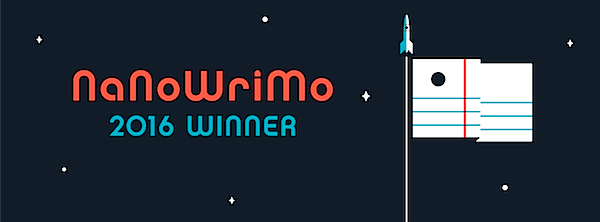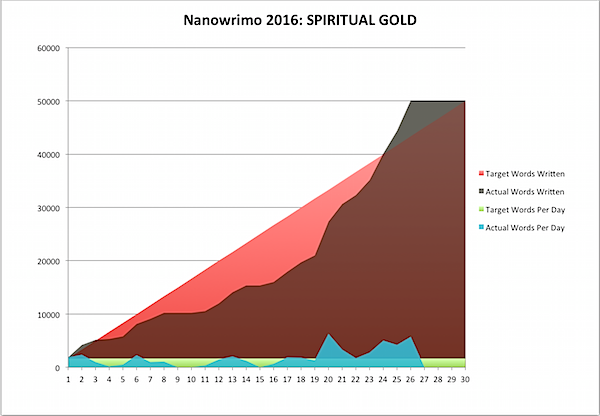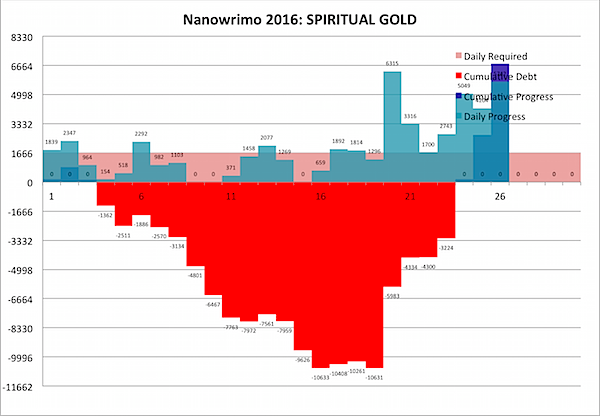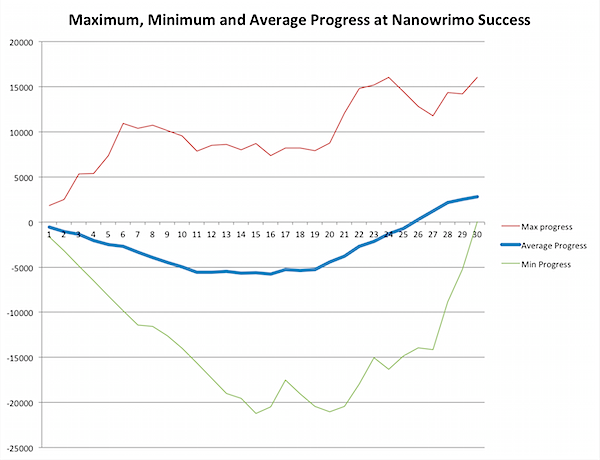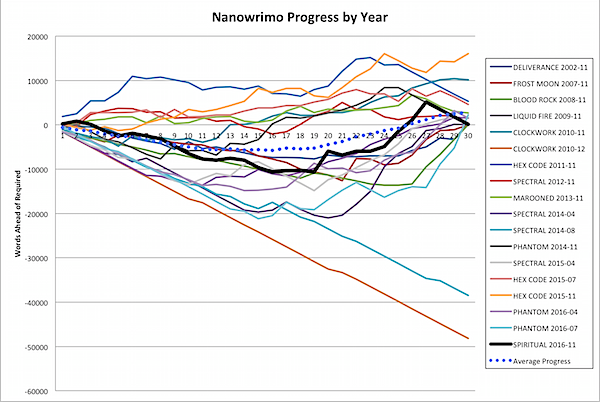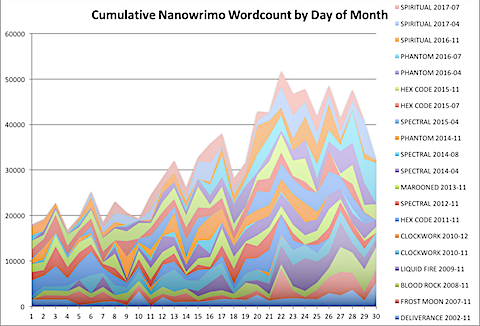
Above you see a big pile of all the words I’ve written in National Novel Writing Month and related challenges, laid out horizontally by day of month and laid down vertically by the challenge in which I wrote them, creating an interesting strata effect, like words deposited by a geological process. This month marks my 20th attempt at Nano, 18 of which were successful:
| Deliverance |
2002 |
Nanowrimo |
WINNER |
| Frost Moon |
2007 |
Nanowrimo |
WINNER |
| Blood Rock |
2008 |
Nanowrimo |
WINNER |
| Liquid Fire |
2009 |
Nanowrimo |
WINNER |
| Clockwork |
2010 |
Nanowrimo |
WINNER |
| Clockwork |
2010 |
December Nano |
FAILED |
| Hex Code |
2011 |
Nanowrimo |
WINNER |
| Clockwork |
2012 |
Script Frenzy |
WINNER |
| Spectral Iron |
2012 |
Nanowrimo |
WINNER |
| Marooned |
2013 |
Nanowrimo |
WINNER |
| Spectral Iron |
2014 |
Camp Nanowrimo |
WINNER |
| Spectral Iron |
2014 |
August Nano |
FAILED |
| Phantom Silver |
2014 |
Nanowrimo |
WINNER |
| Spectral Iron |
2015 |
Camp Nanowrimo |
WINNER |
| Hex Code |
2015 |
Nanowrimo |
WINNER |
| Phantom Silver |
2016 |
Camp Nanowrimo |
WINNER |
| Phantom Silver |
2016 |
Camp Nanowrimo |
WINNER |
| Spiritual Gold |
2016 |
Nanowrimo |
WINNER |
| Spiritual Gold |
2017 |
Camp Nanowrimo |
WINNER |
| Spiritual Gold |
2017 |
Camp Nanowrimo |
WINNER |
As I’ve noted before, the two in which I failed were “off months” where I tried to tackle Nanowrimo on my own. For me, it’s much harder without the external benefit of the contest, and on the two times I tried it I bombed out after a few days. You can see that in this graph, which shows the number of words I’m ahead or behind at each part of the month:
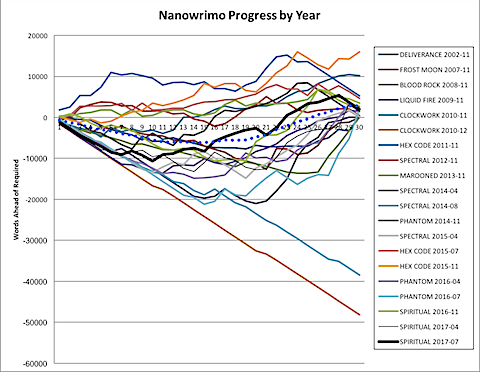
This graph means the most to me, because I was involved in the creation of it, and so intuitively understand it; if I see my monthly progress (the darkest line above) below the dotted line of the average, I know to worry; if I see it below my worst track for any part of the month, I know to really get cracking. Looks like the farthest behind I ever got (and succeeded) was 20,00 words behind, on LIQUID FIRE in 2009, and in PHANTOM SILVER in 2016.
But for people not intimately involved in laying down those tracks, the average amount ahead / behind per day is perhaps more useful:
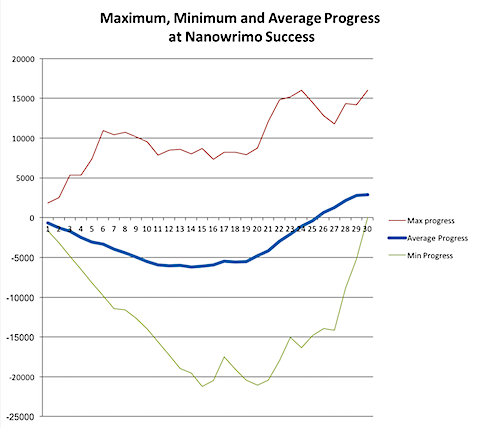
This shows that a successful Nanowrimo participant can be very far ahead, or very far behind, and still win in the month. Do what works for you! There’s a lot of wiggle room in there.
But if you’re more interested in brass tacks, here’s the maximum and average amount I wrote in each day:
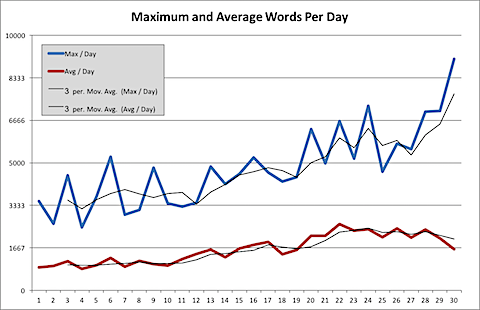
This shows that typically at the start of Nano I’m writing a little bit less than the needed word count per day, and at the end of Nano I’m writing a little bit more - but that the maximum I have to do each day is radically more than that - once almost 10,000 words (and that was a hell of a push, I can tell you - that was PHANTOM SILVER in July of 2016, and I was down to the wire, writing 7000 words in the last day - and finding the Camp Nano counter was 2000 words off of Microsoft Word’s count, so I had to generate 2,000 more words in the last couple of hours).
I will probably dig a bit more into SPIRITUAL over the last two days of the 30 day challenge (I know July has an extra day, but I can use the break). I’m not quite done - the manuscript is at 171,330 words, but maybe 20,000 to 30,000 words of that are in-manuscript notes that need to be turned into text, and then I have a lot I want to cut. During Nano, if I change my mind about how a scene is going, I don’t cut it and rewrite it, because that defeats the purpose of generating words; I write the word ALTERNATELY on its own line and rewrite the scene. After Nano, all that needs to get edited, merged and/or cut.
Often, I find that I’m not satisfied with the first rough draft text I produce in Nano. There are amazing gems in there, but also drek. But at the same time, I find that I am almost always very satisfied at having a text that flows through all the scenes I wanted to write. The idea of a scene in your head is just that - an idea. It’s not real until you write it. If you don’t write it, you can’t improve it - you’ll either long for it to be written, or you’ll elaborate on your idea of it in your head endlessly, or, worst of all, get caught up in the smug satisfaction of your own unfinished work, admiring the creation of something awesome that doesn’t actually exist.
But once you write it, you can see whether the idea works or not. You can decide to keep it, or refine it, or discard it. Even better, it springboards you - into new alternates for the same scene, or new ideas for what happens next, or new insights into your character, their plot, and the themes of your story.
Don’t just dream your story - write it down. Only by writing dreams down can you turn them into reality.
And Nanowrimo is a great place to get started with that. The 50,000 word challenge may seem impossible. It may not even seem like the kind of thing you want to do. No one is making you, after all: you don’t have to. But if your head is filling with ideas and you can’t get them out, why not take on an impossible seeming challenge to write 50,000 words of them down.
Believe me, it’s possible.
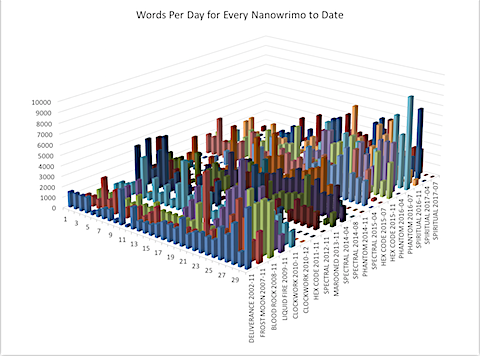
-the Centaur
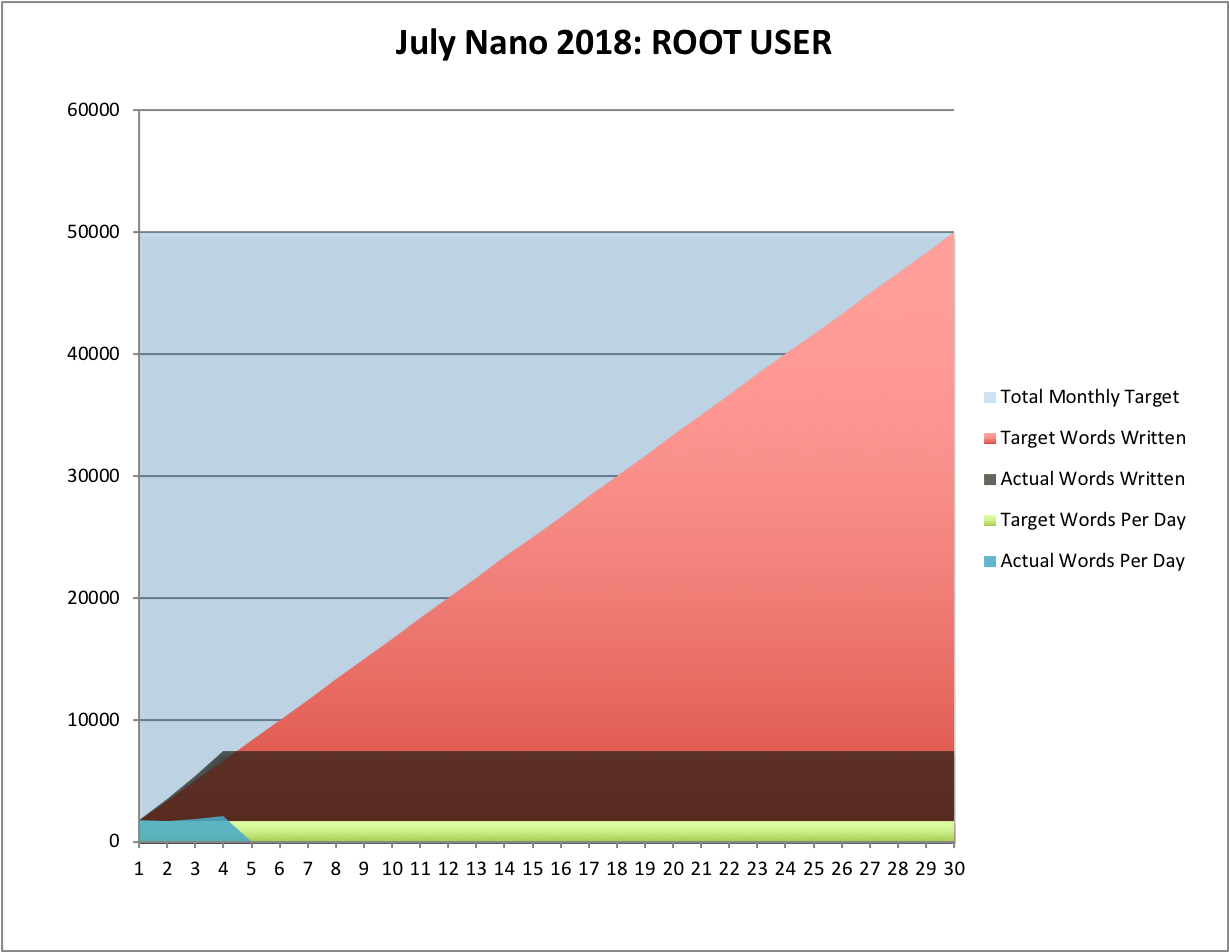 Well, the Nano climb is starting off great, for a switch! Fourth of July, and I'm already 800 words ahead of what my goal is for this time of the month.
Well, the Nano climb is starting off great, for a switch! Fourth of July, and I'm already 800 words ahead of what my goal is for this time of the month.
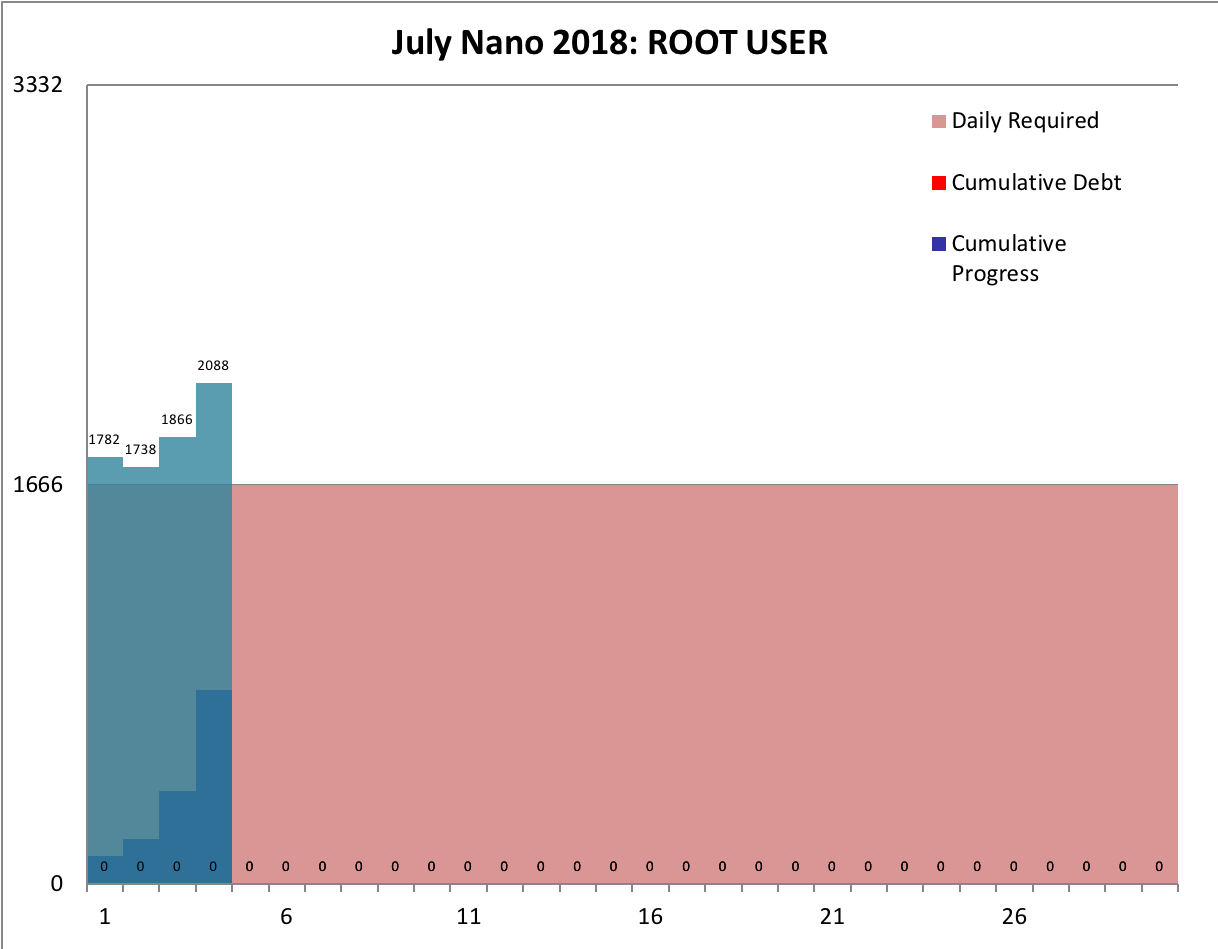 Not bad, but then, I am on vacation. :-) An excerpt:
Not bad, but then, I am on vacation. :-) An excerpt:
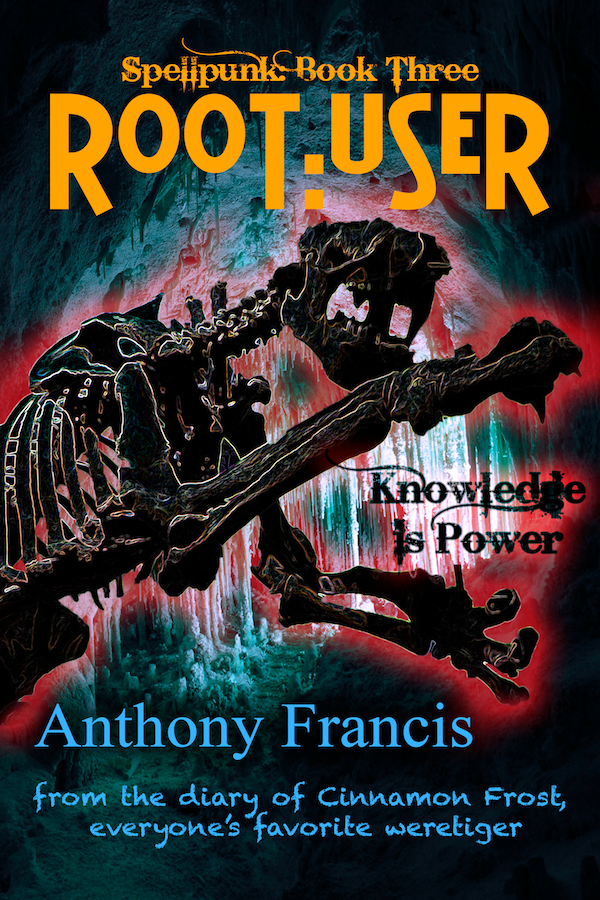 Well, so insanely busy, I haven't posted in a while. But not for want of working on things that I want to post about! Most pressingly, my Camp Nano project for the July Camp of 2018, and what I hope is the last major chunk of the third book in the Cinnamon Frost series ...
Well, so insanely busy, I haven't posted in a while. But not for want of working on things that I want to post about! Most pressingly, my Camp Nano project for the July Camp of 2018, and what I hope is the last major chunk of the third book in the Cinnamon Frost series ... 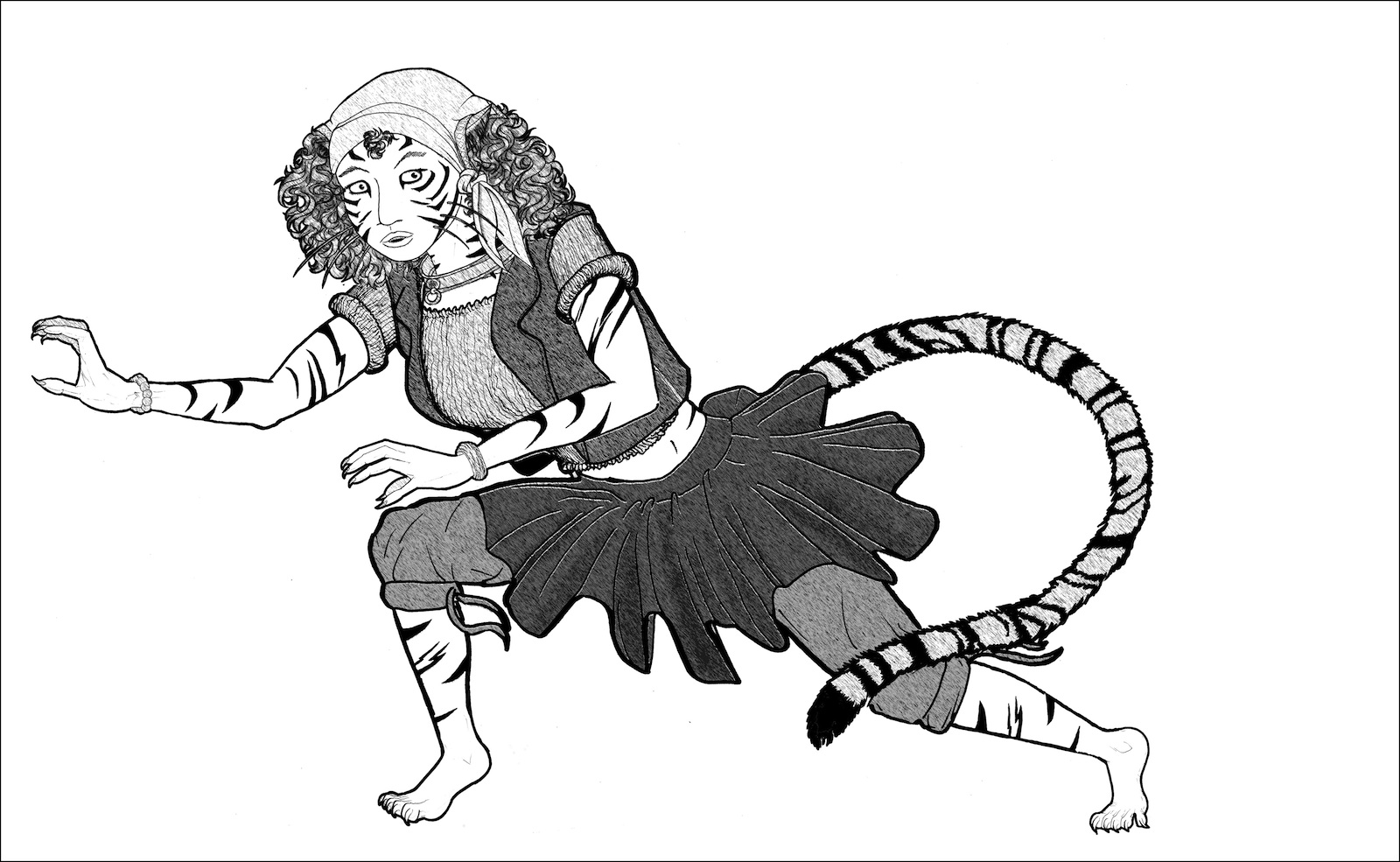 And I'm supposed to tell you that my biographer, Anthony Francis, is working on my third book, ROOT USER, for
And I'm supposed to tell you that my biographer, Anthony Francis, is working on my third book, ROOT USER, for 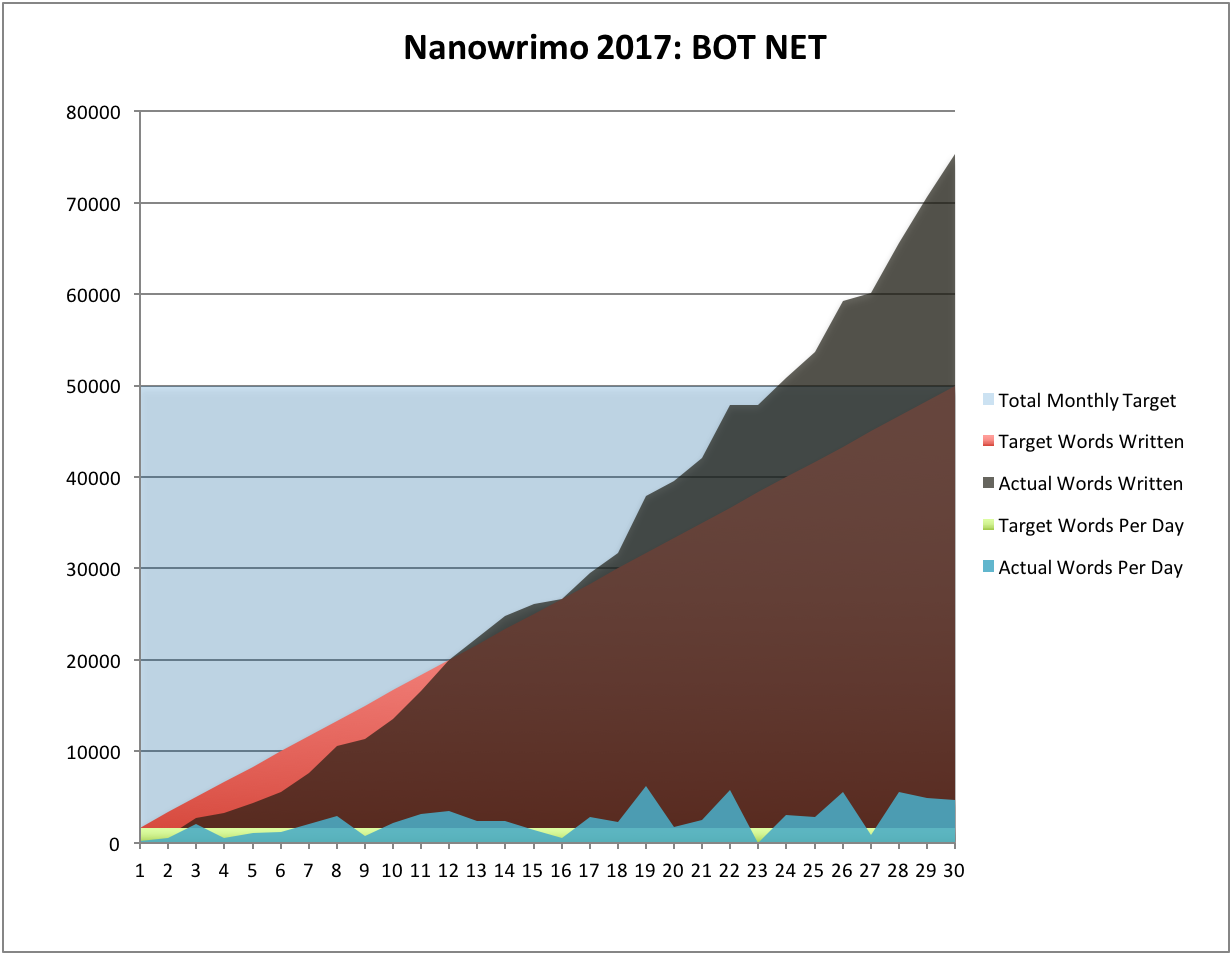 This somehow all magically happened because I never lost my momentum after the Night of Writing Dangerously, oh, and because this is Cinnamon Frost, and she's awesome!
This somehow all magically happened because I never lost my momentum after the Night of Writing Dangerously, oh, and because this is Cinnamon Frost, and she's awesome!
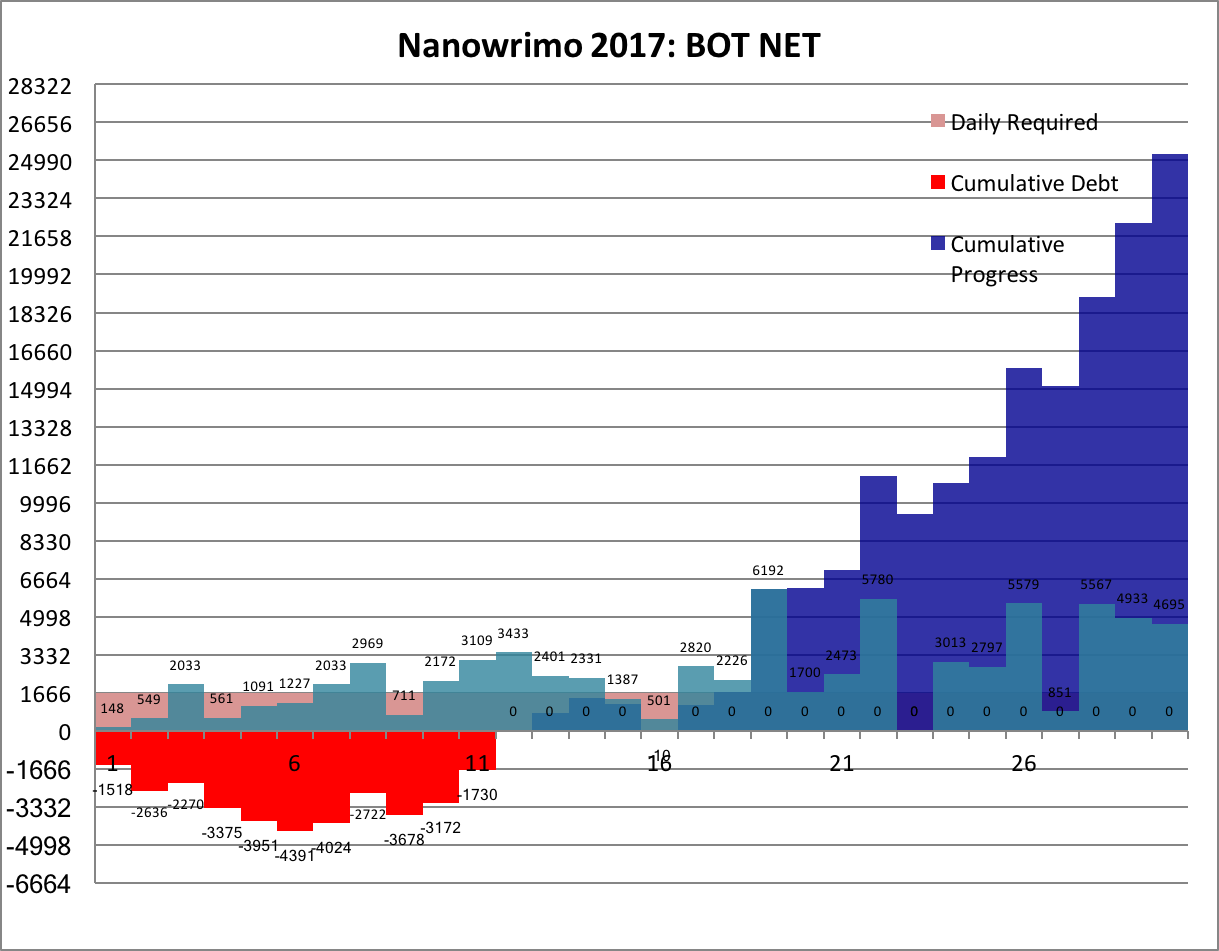 This is the most I've ever written in Nano, by a long shot - almost 10,000 words more. Not quite, and I'm not super motivated to make it exactly 10,000 words more. If I think of more words tonight, eh maybe.
This is the most I've ever written in Nano, by a long shot - almost 10,000 words more. Not quite, and I'm not super motivated to make it exactly 10,000 words more. If I think of more words tonight, eh maybe.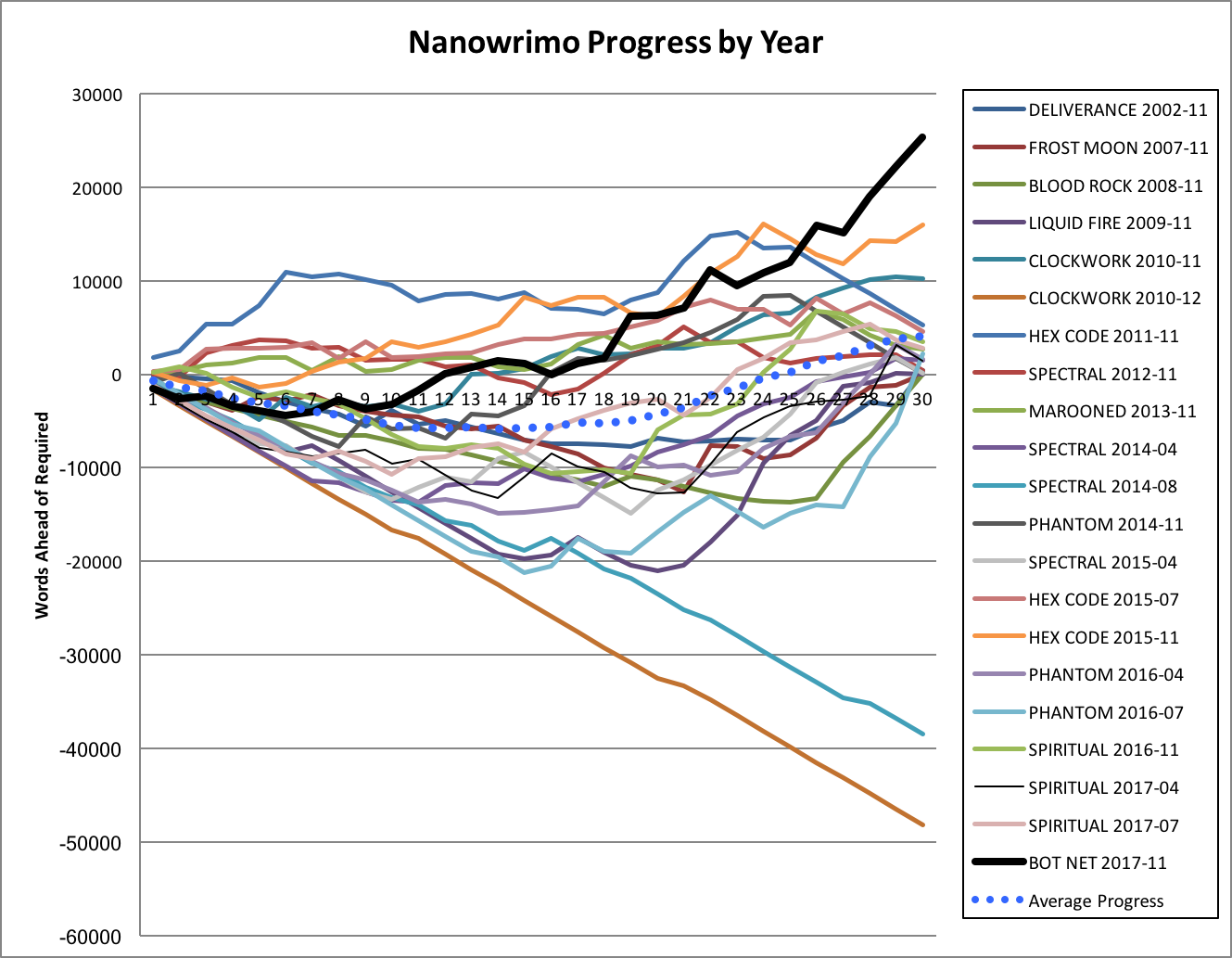 Oh yes, the traditional excerpt:
Oh yes, the traditional excerpt:
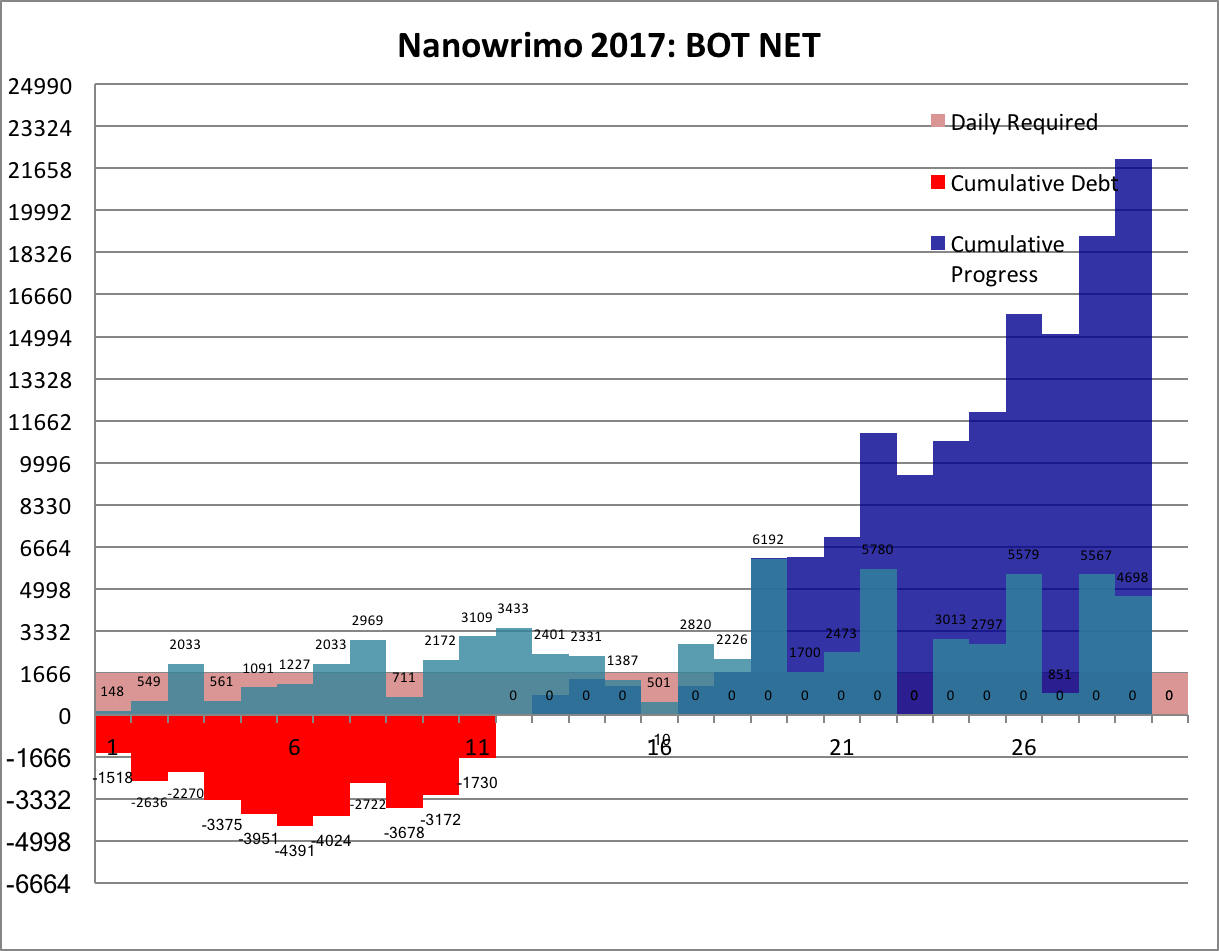 I won't just beat my best record ever (which I already have) ...
I won't just beat my best record ever (which I already have) ...
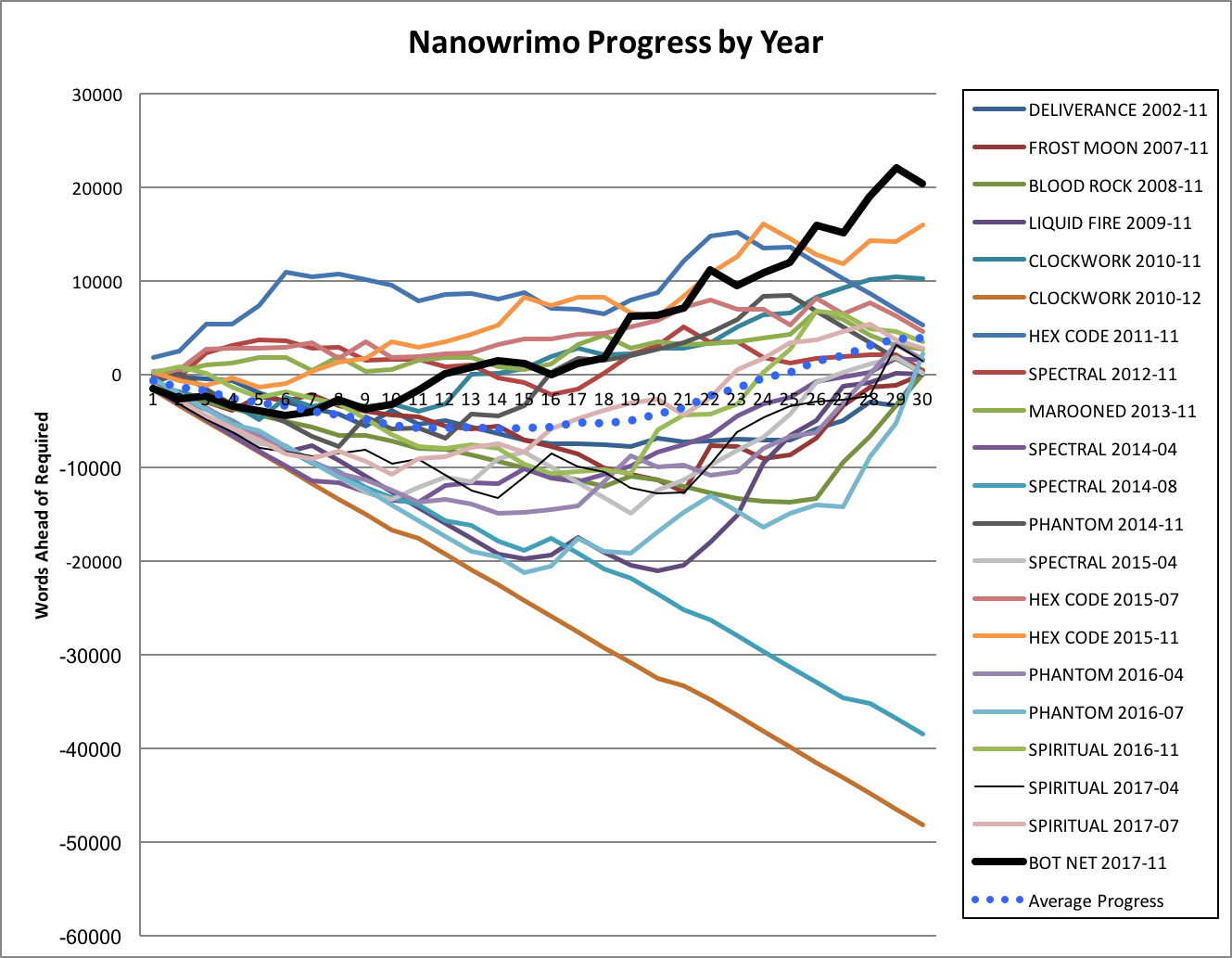 ... I'll hit the somewhat ludicrous amount of 75,000 words in a month, beyond the 70,000 I've already hit.
... I'll hit the somewhat ludicrous amount of 75,000 words in a month, beyond the 70,000 I've already hit.
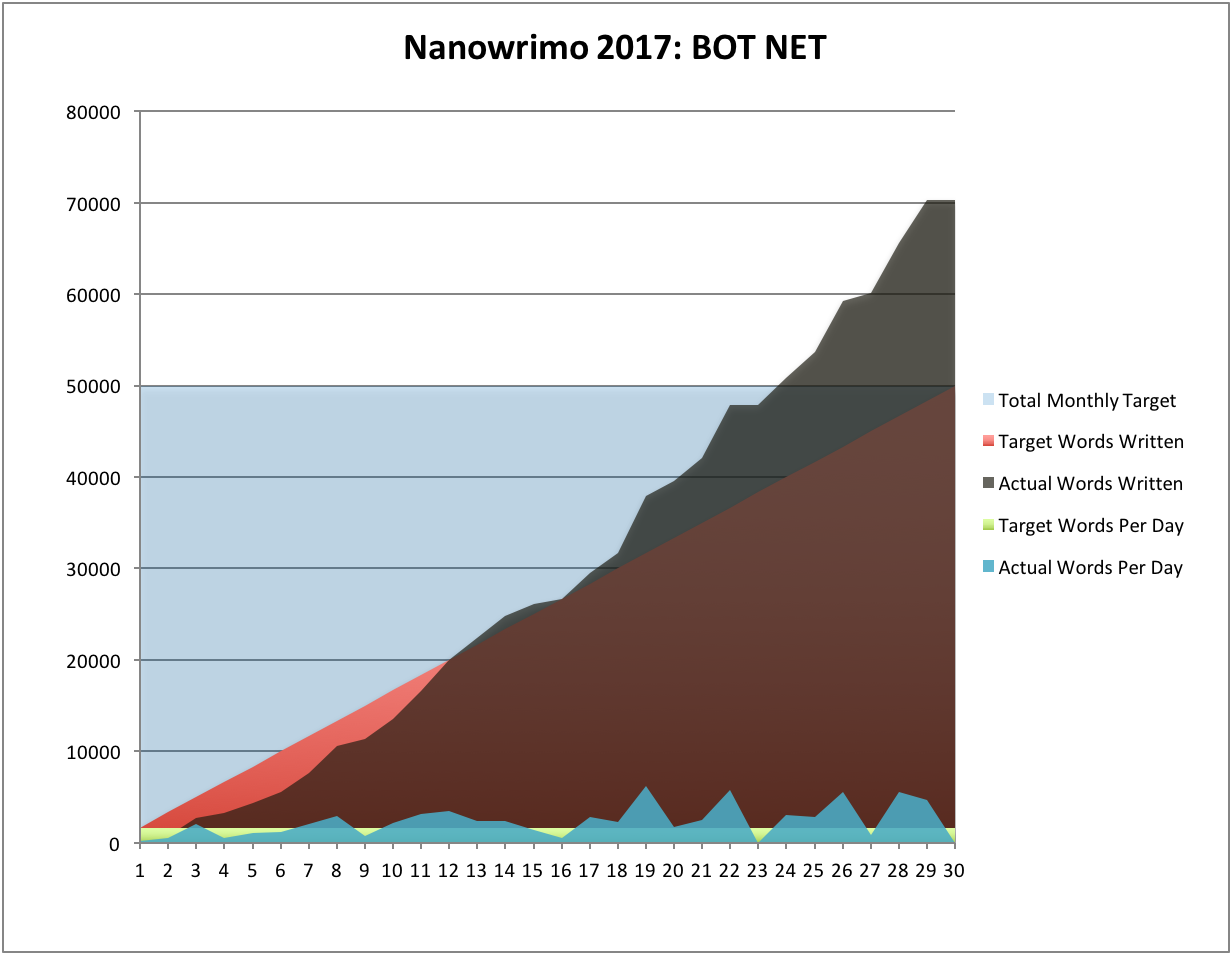 4,648 words to hit that goal ... less than I did yesterday or even today. Let's get cracking.
-the Centaur
4,648 words to hit that goal ... less than I did yesterday or even today. Let's get cracking.
-the Centaur 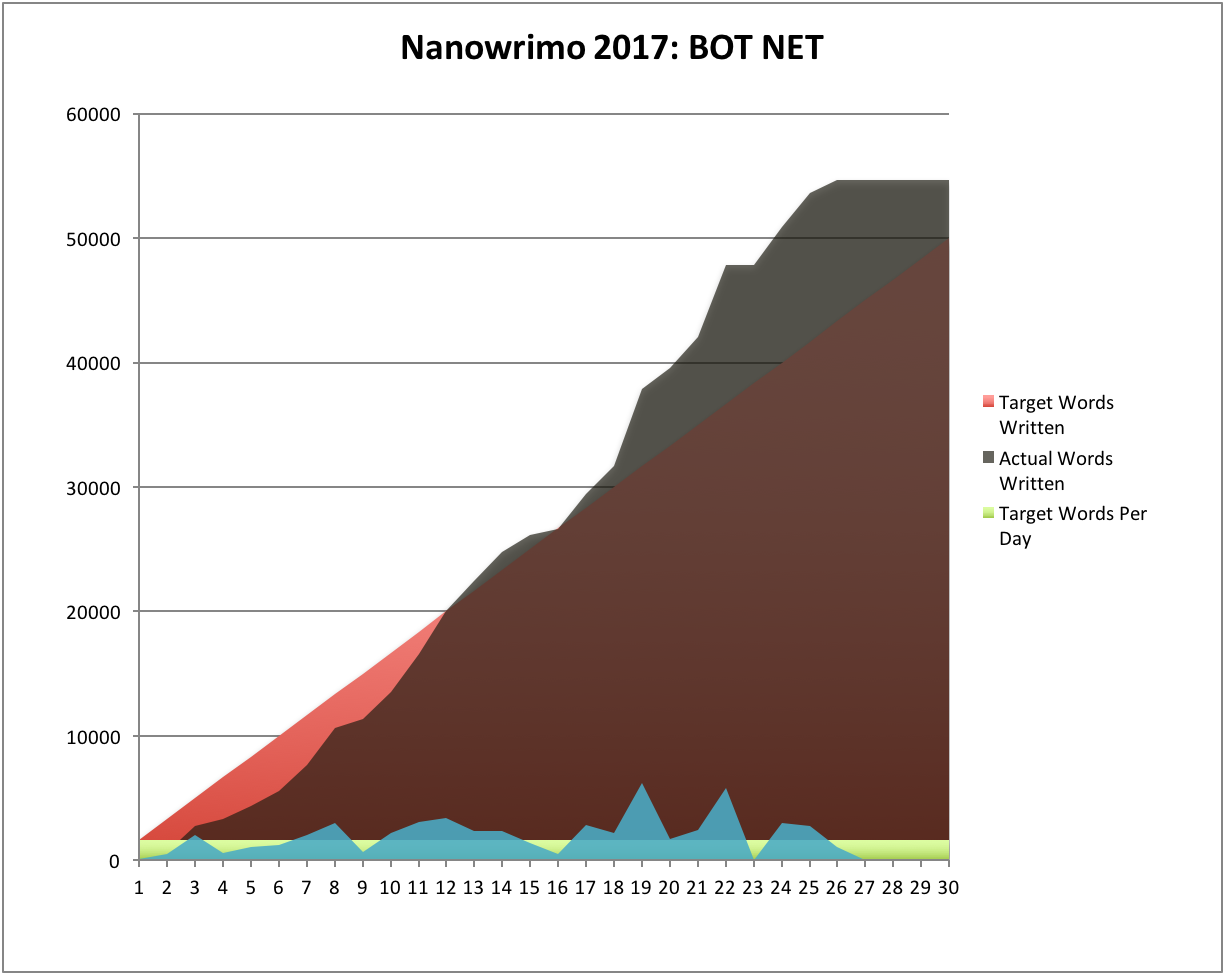 ~2900 words a day, not counting today ...
~2900 words a day, not counting today ...
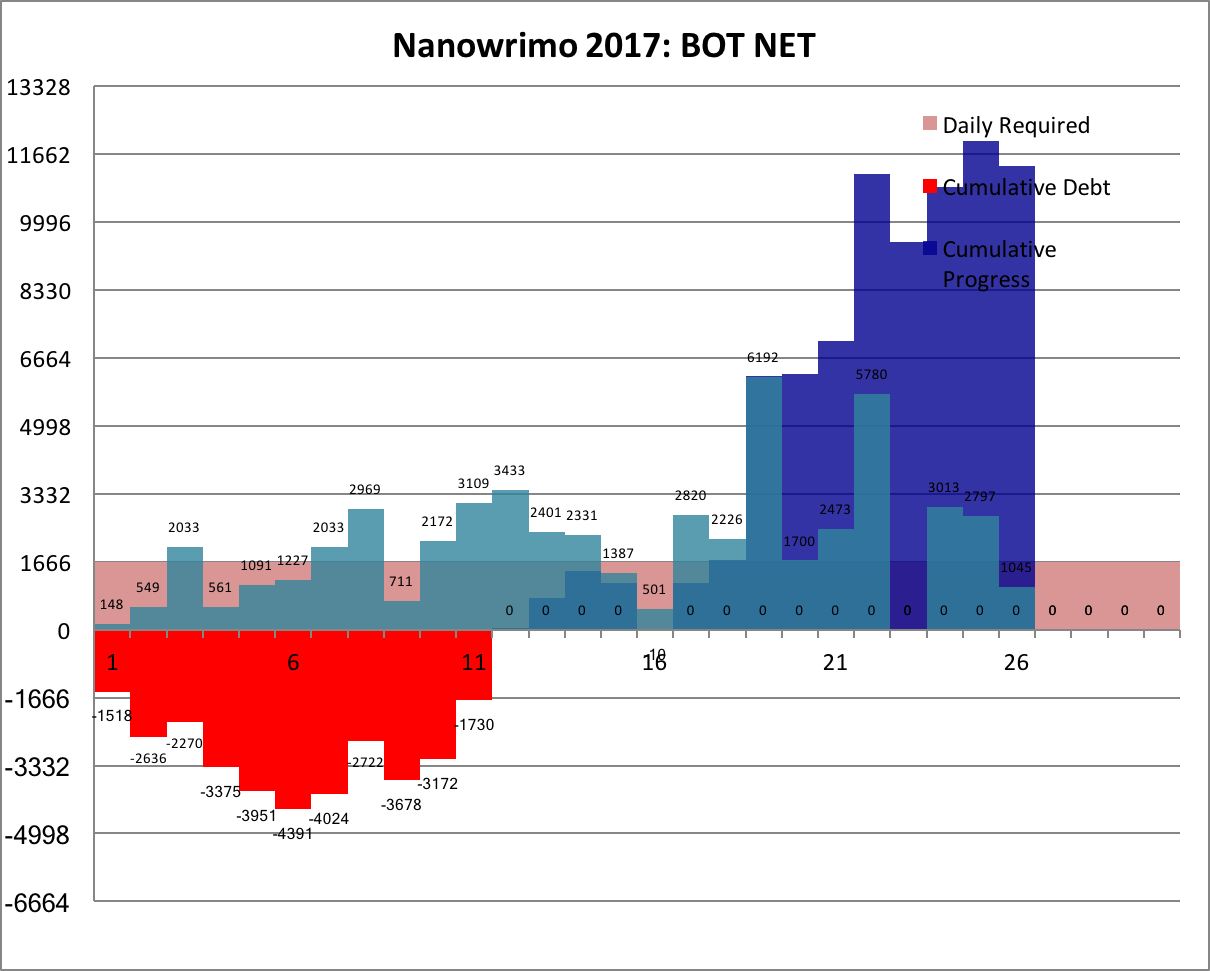 I will beat my all time Nanowrimo record of 65,995 words:
I will beat my all time Nanowrimo record of 65,995 words:
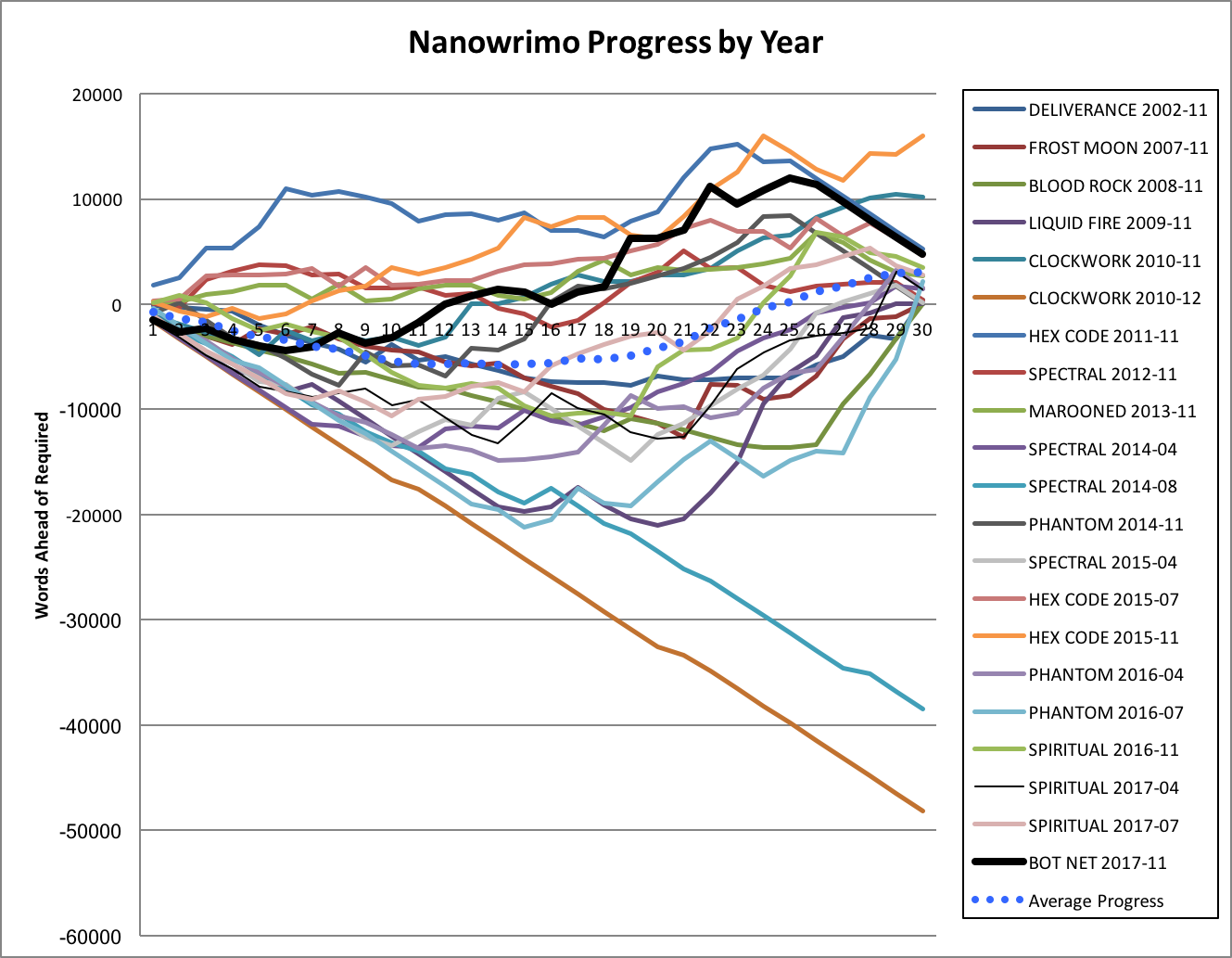 Sounds like a worthier goal than spending the same words responding to everyone who's wrong on the Internet.
Onward!
-the Centaur
Sounds like a worthier goal than spending the same words responding to everyone who's wrong on the Internet.
Onward!
-the Centaur 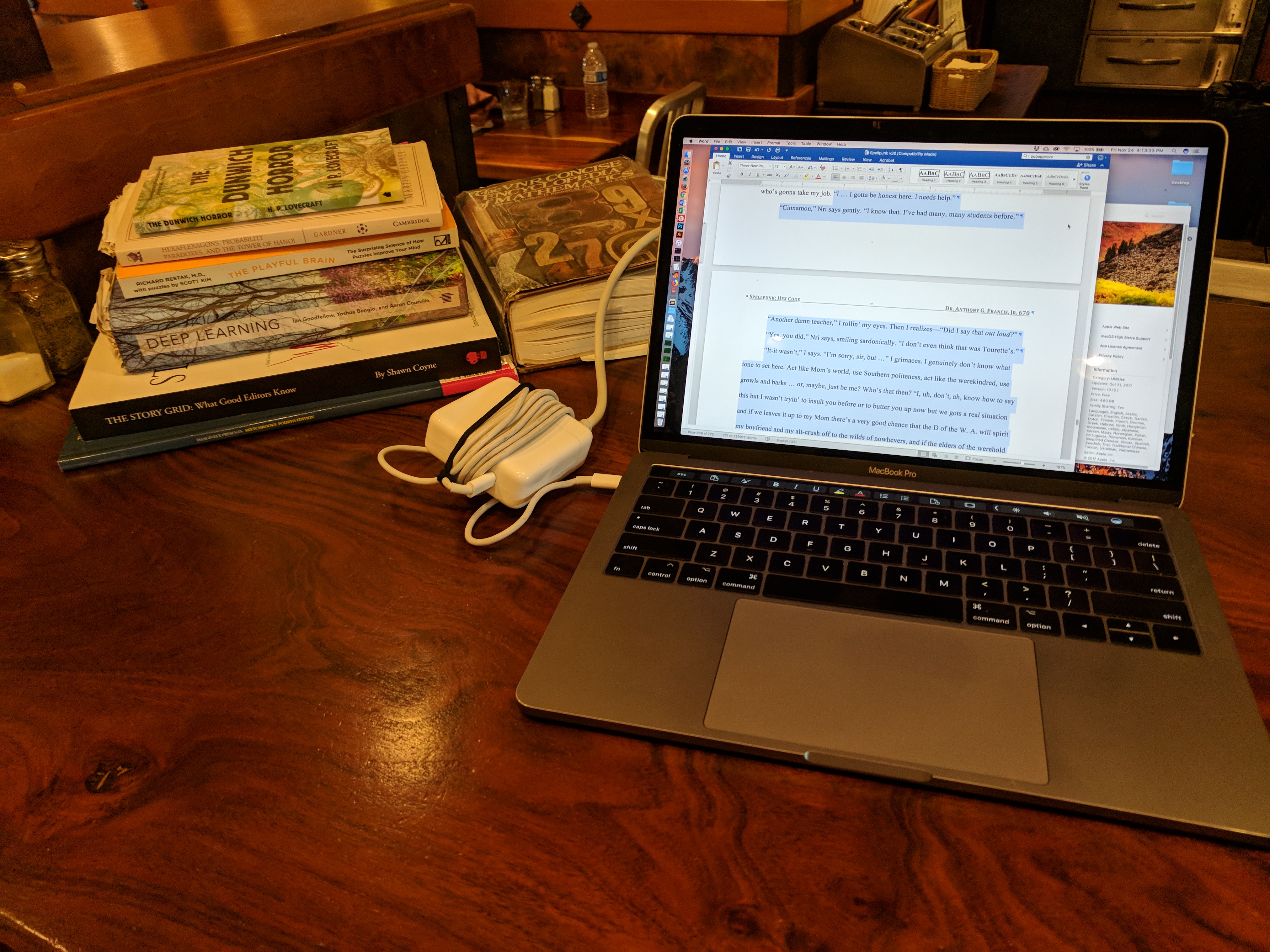 Hey gang, now that I've succeeded at National Novel Writing Month nineteen times, I thought I'd take a little time out to tell you that my secret to National Novel Writing Month success is to put Nano first.
Hey gang, now that I've succeeded at National Novel Writing Month nineteen times, I thought I'd take a little time out to tell you that my secret to National Novel Writing Month success is to put Nano first.
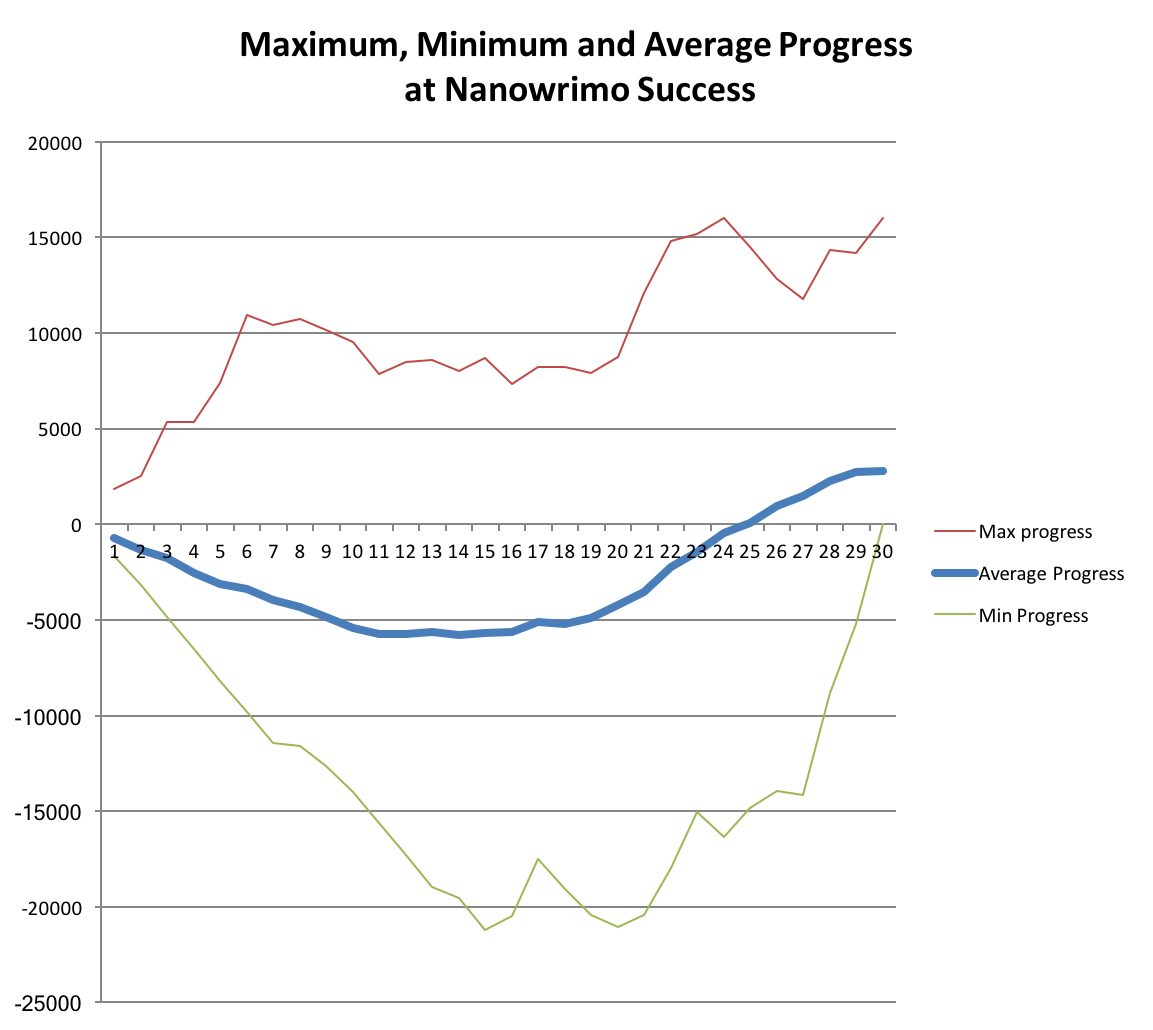 Now, that seems obvious - almost, like, too obvious to be advice - but I want to put it into perspective by first asking you a few questions.
Now, that seems obvious - almost, like, too obvious to be advice - but I want to put it into perspective by first asking you a few questions.
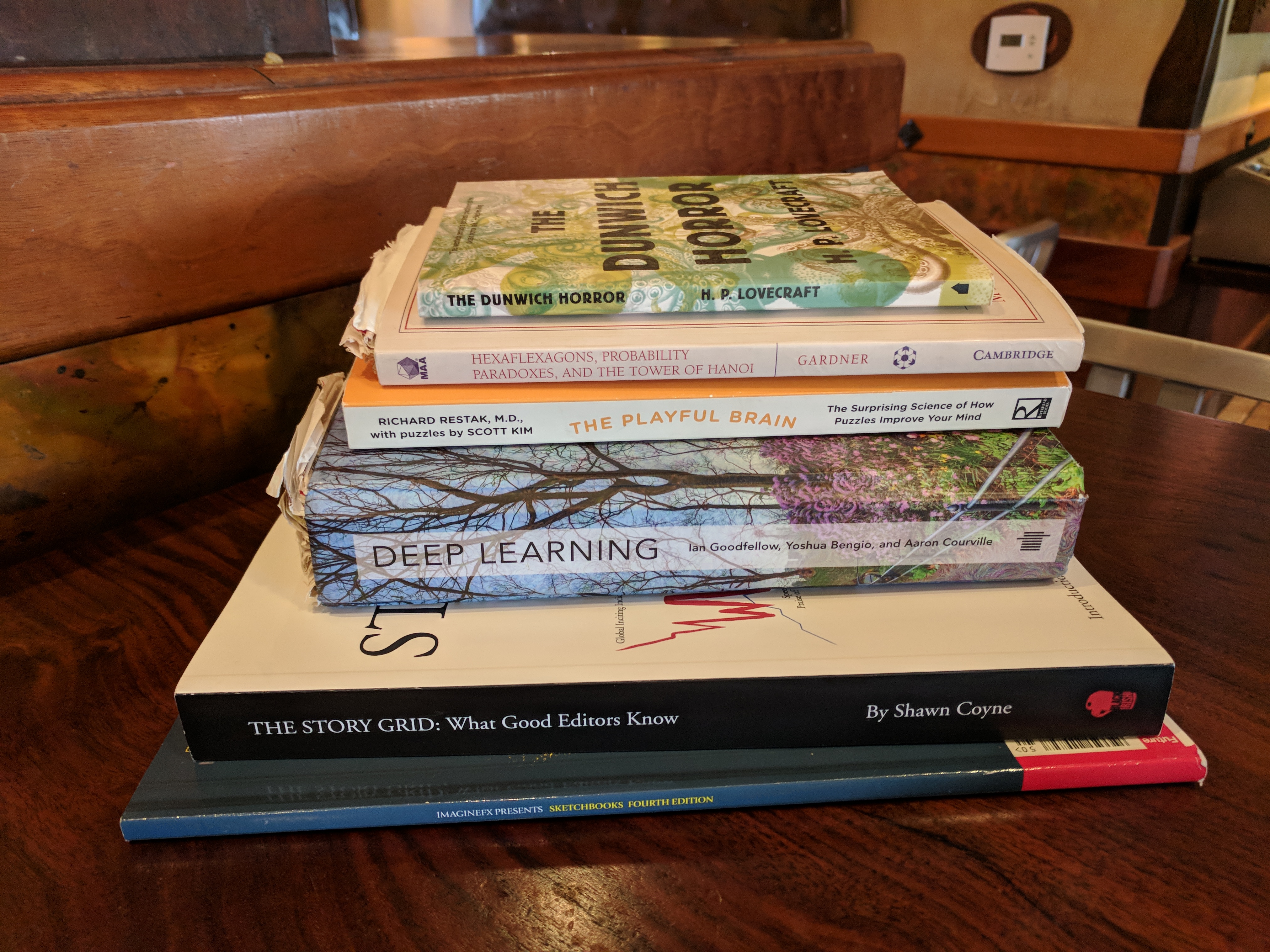
 This year, I was working on
This year, I was working on 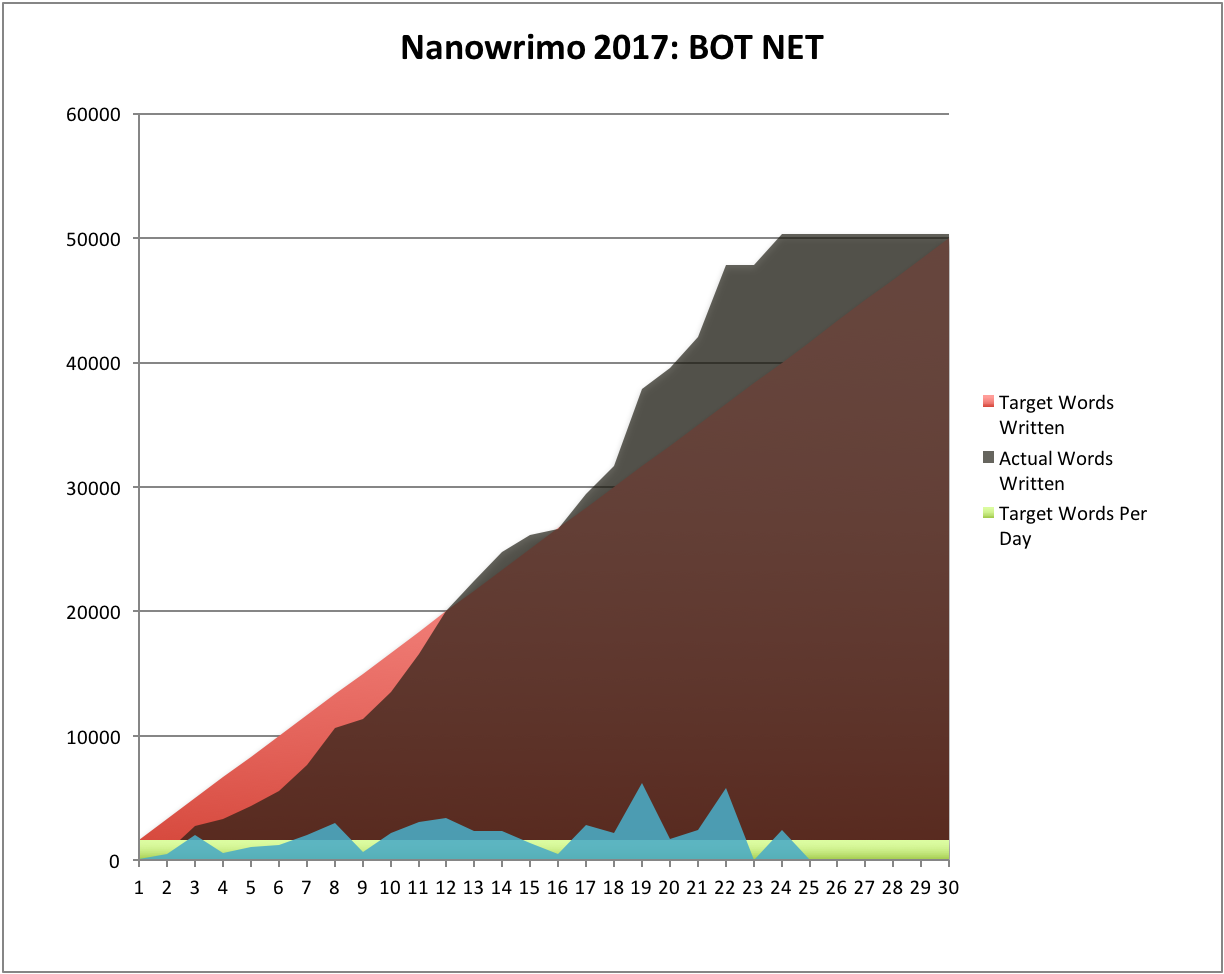 This year, the combination of participating in the
This year, the combination of participating in the 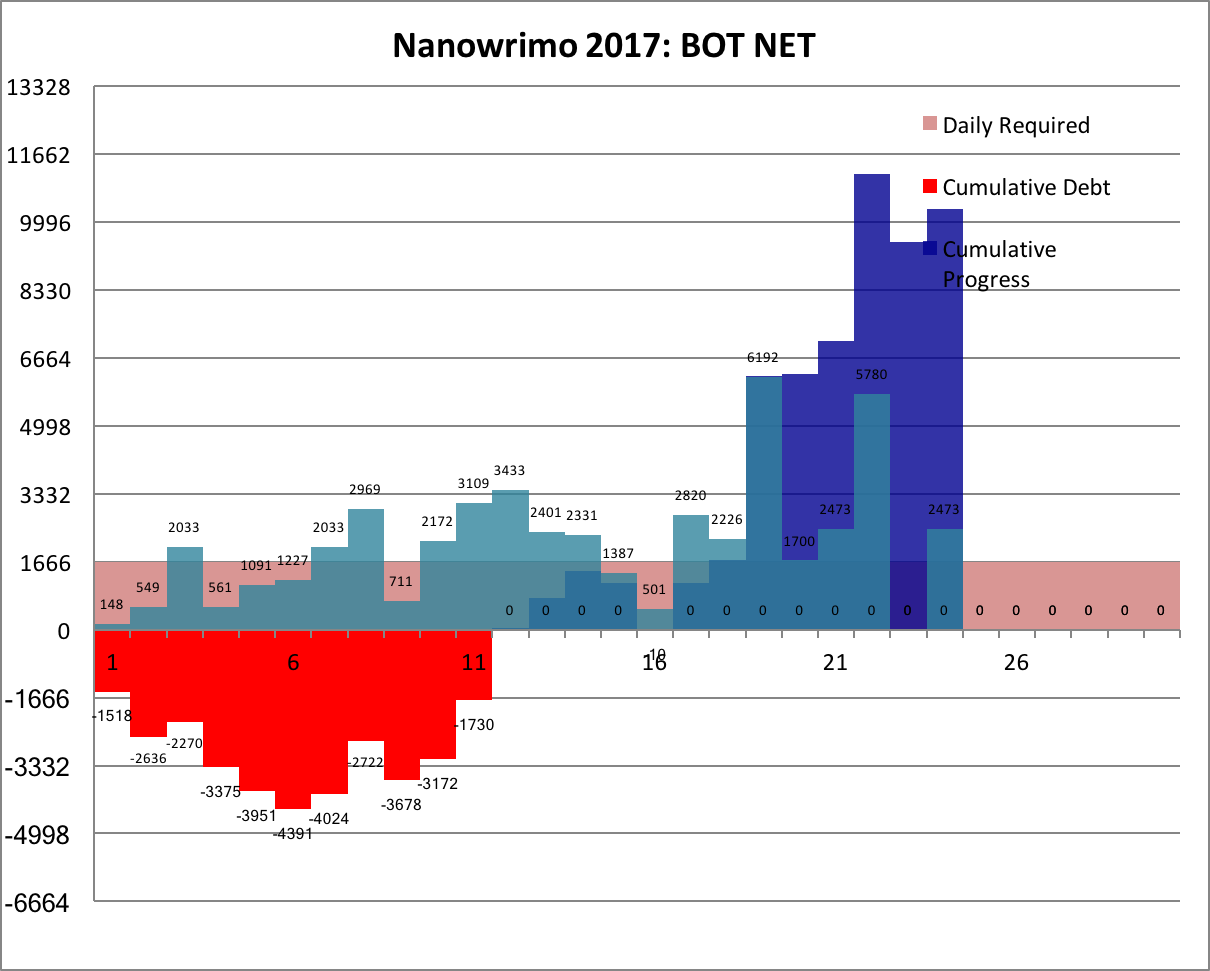 Interesting, the hole at Thanksgiving. I wonder if that's true every year? That's not something you can readily see when you look at the yearly charts since it moves (stay tuned, these charts are going to come back later):
Interesting, the hole at Thanksgiving. I wonder if that's true every year? That's not something you can readily see when you look at the yearly charts since it moves (stay tuned, these charts are going to come back later):
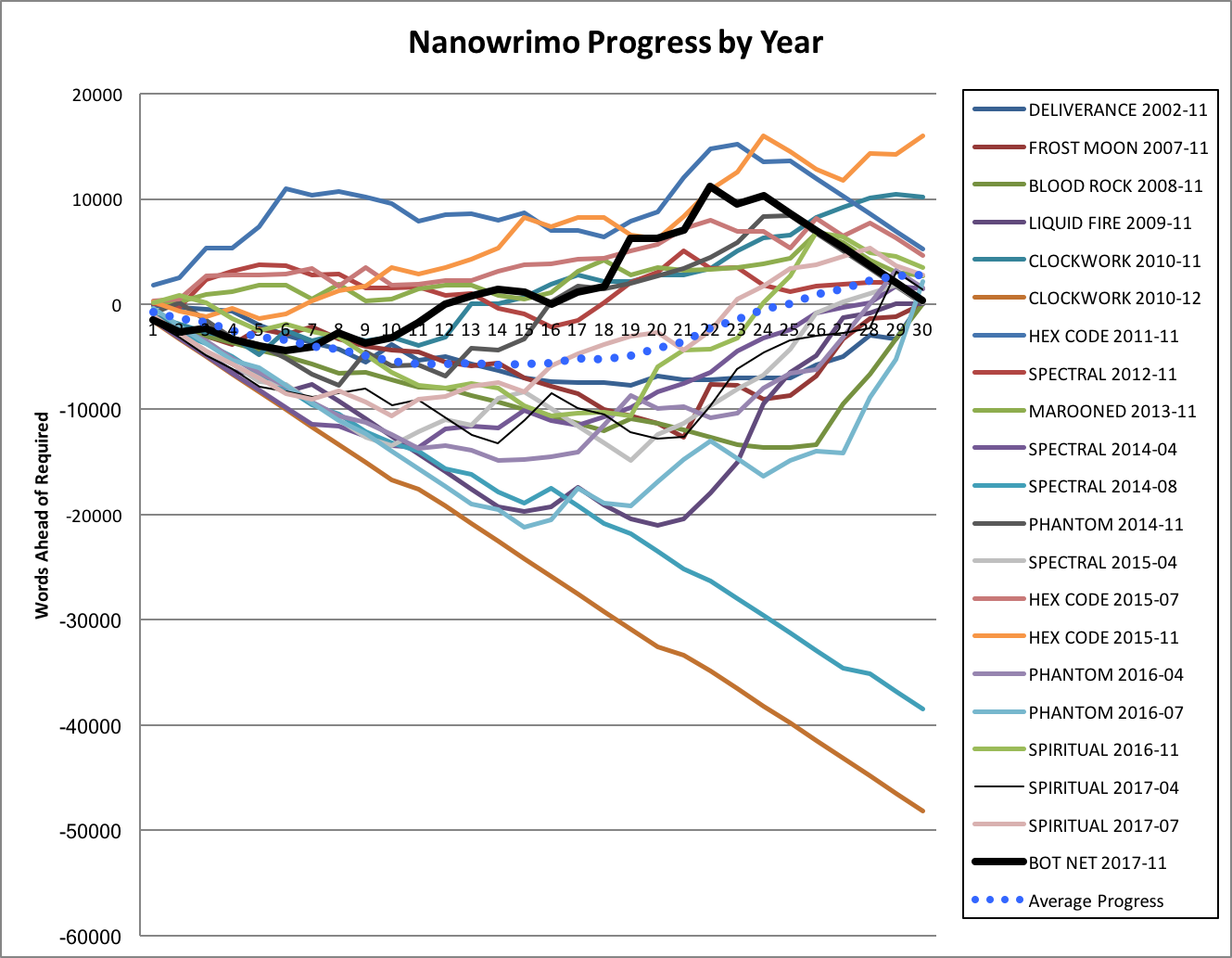 There was a time when almost every post about Nanowrimo I'd include an excerpt. Frankly, that's gotten harder to do as I've switched from doing Nano once per year to three times per year; the Nano material has become more inchoate as I blaze new paths out into story space, requiring more work to turn it into final material. But, occasionally, I can indeed include some material that gives you a flavor ...
There was a time when almost every post about Nanowrimo I'd include an excerpt. Frankly, that's gotten harder to do as I've switched from doing Nano once per year to three times per year; the Nano material has become more inchoate as I blaze new paths out into story space, requiring more work to turn it into final material. But, occasionally, I can indeed include some material that gives you a flavor ...
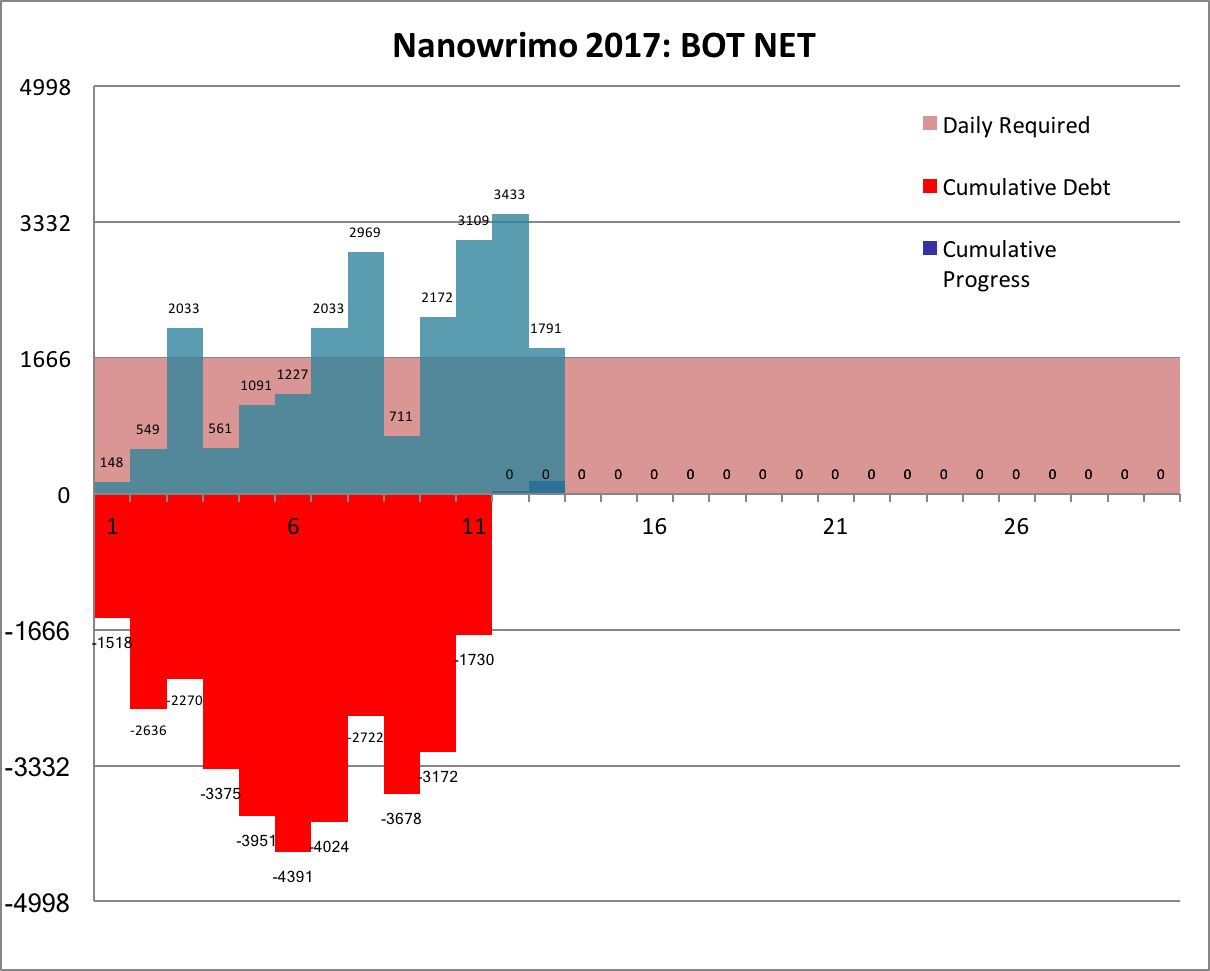 Winning at Nano always feels like climbing a hill, but for me in particular it almost always feels like I start out sliding back down, Sisyphus-like, as I struggle to get a handle on the story.
Winning at Nano always feels like climbing a hill, but for me in particular it almost always feels like I start out sliding back down, Sisyphus-like, as I struggle to get a handle on the story.
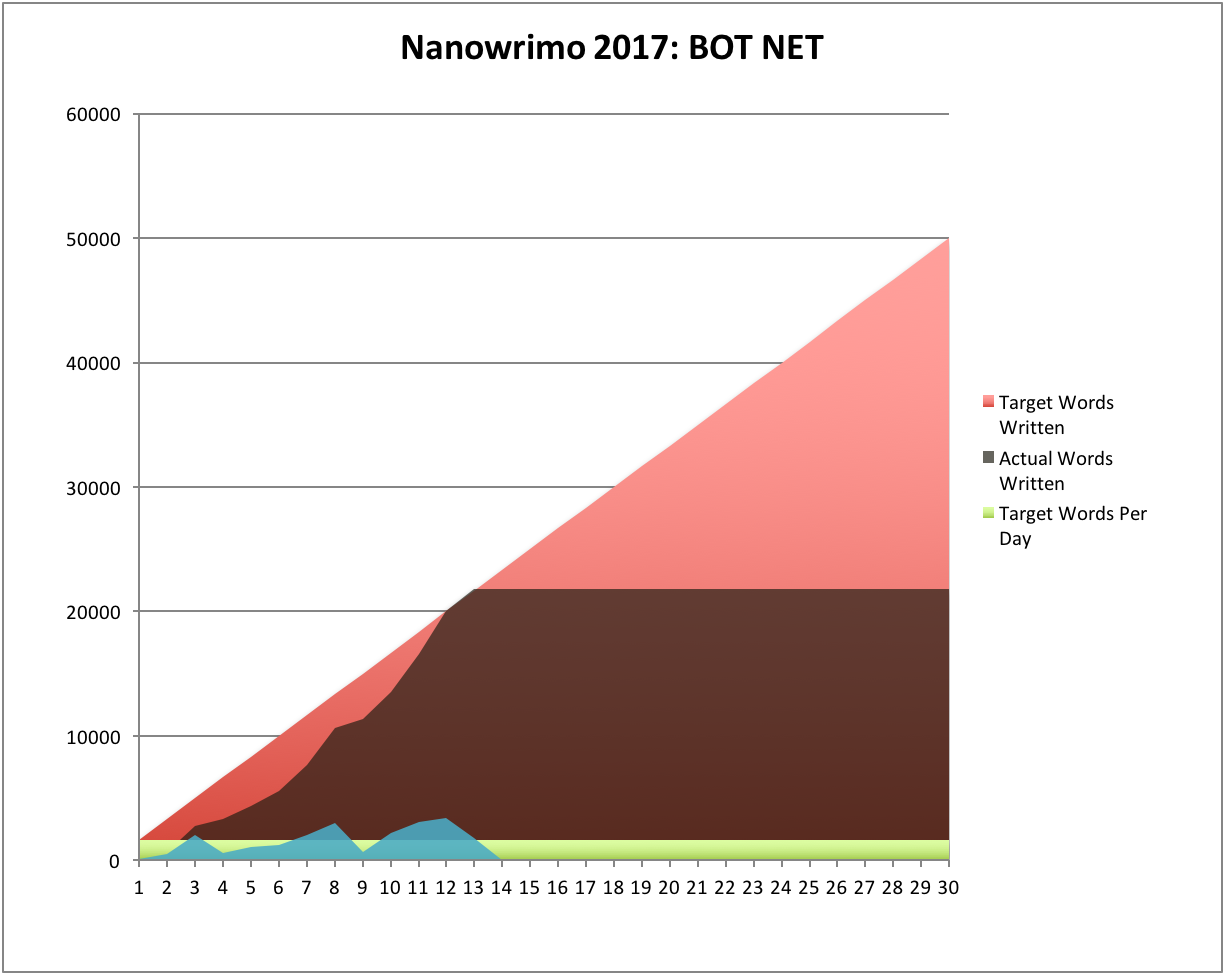 But then there comes that magic point where I need to write 1,666 words in a day and I. Got. Nothing. Then I'm forced to be creative, and the real fun stuff happens, an event I call "going off the rails". Hey, let's try to embed a tweet!
But then there comes that magic point where I need to write 1,666 words in a day and I. Got. Nothing. Then I'm forced to be creative, and the real fun stuff happens, an event I call "going off the rails". Hey, let's try to embed a tweet!
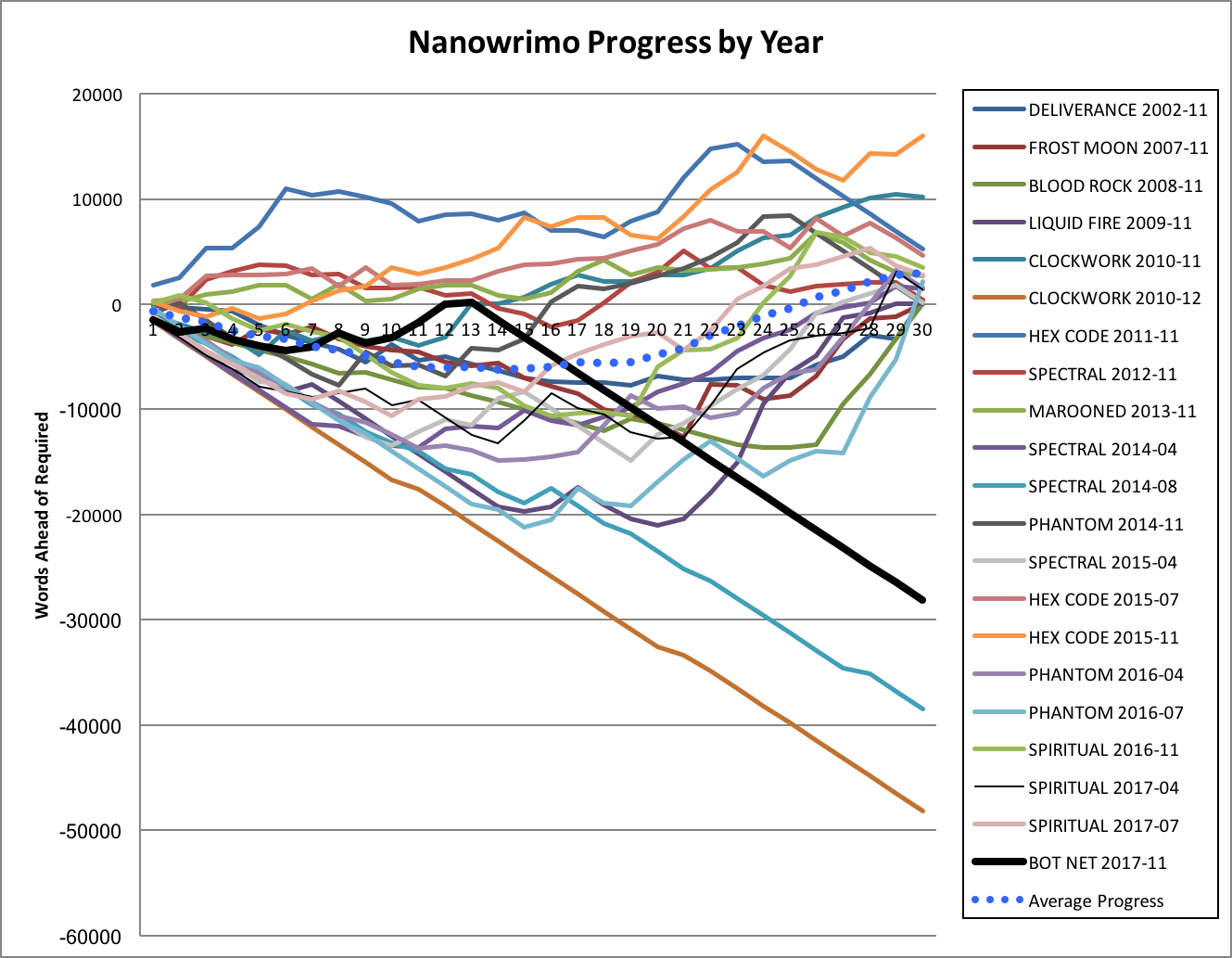 I'm one more thing too: 200,000 words into the Cinnamon Frost trilogy.
I'm one more thing too: 200,000 words into the Cinnamon Frost trilogy.
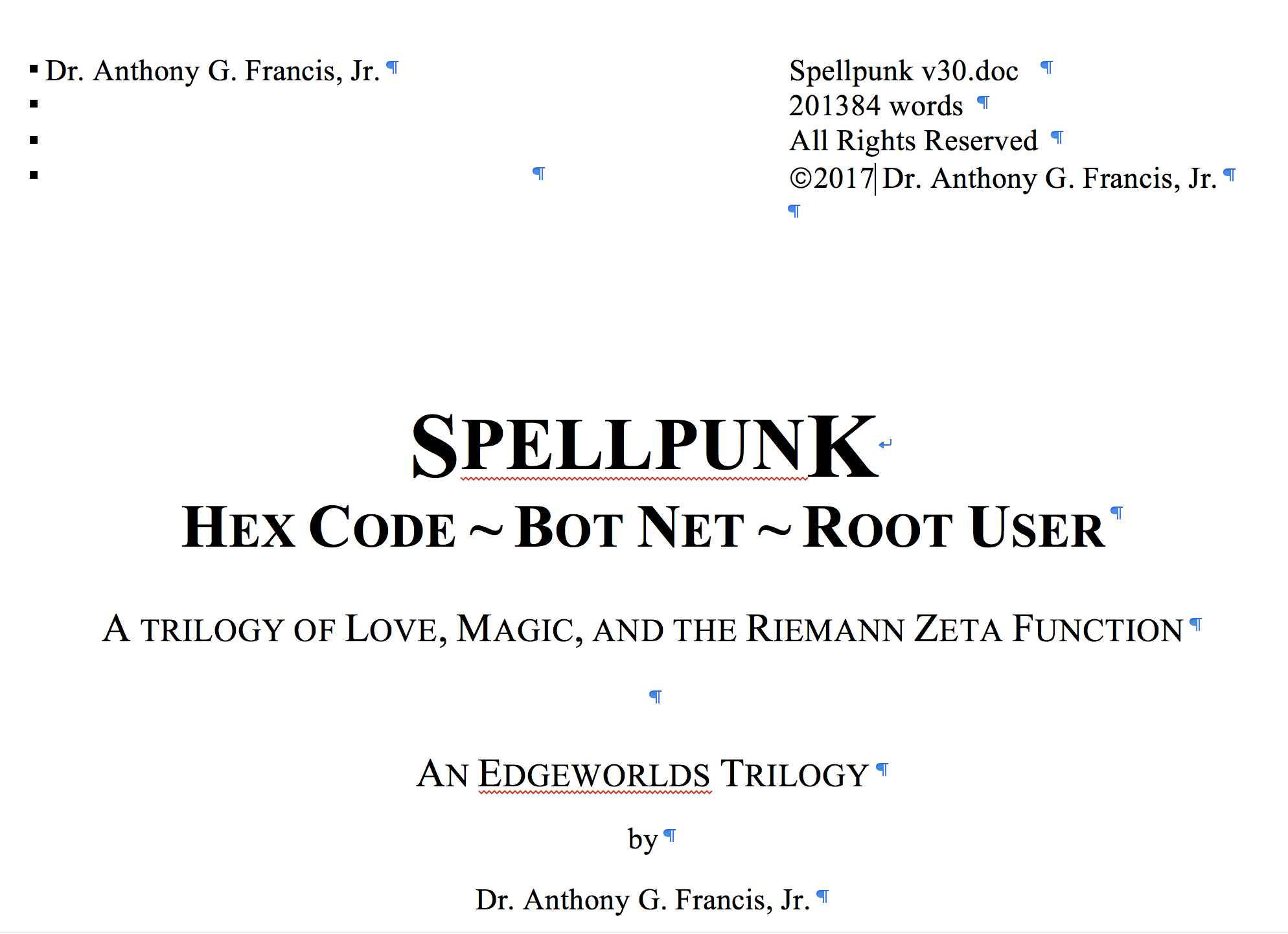 There are 3 published Dakota Frost novels:
There are 3 published Dakota Frost novels: 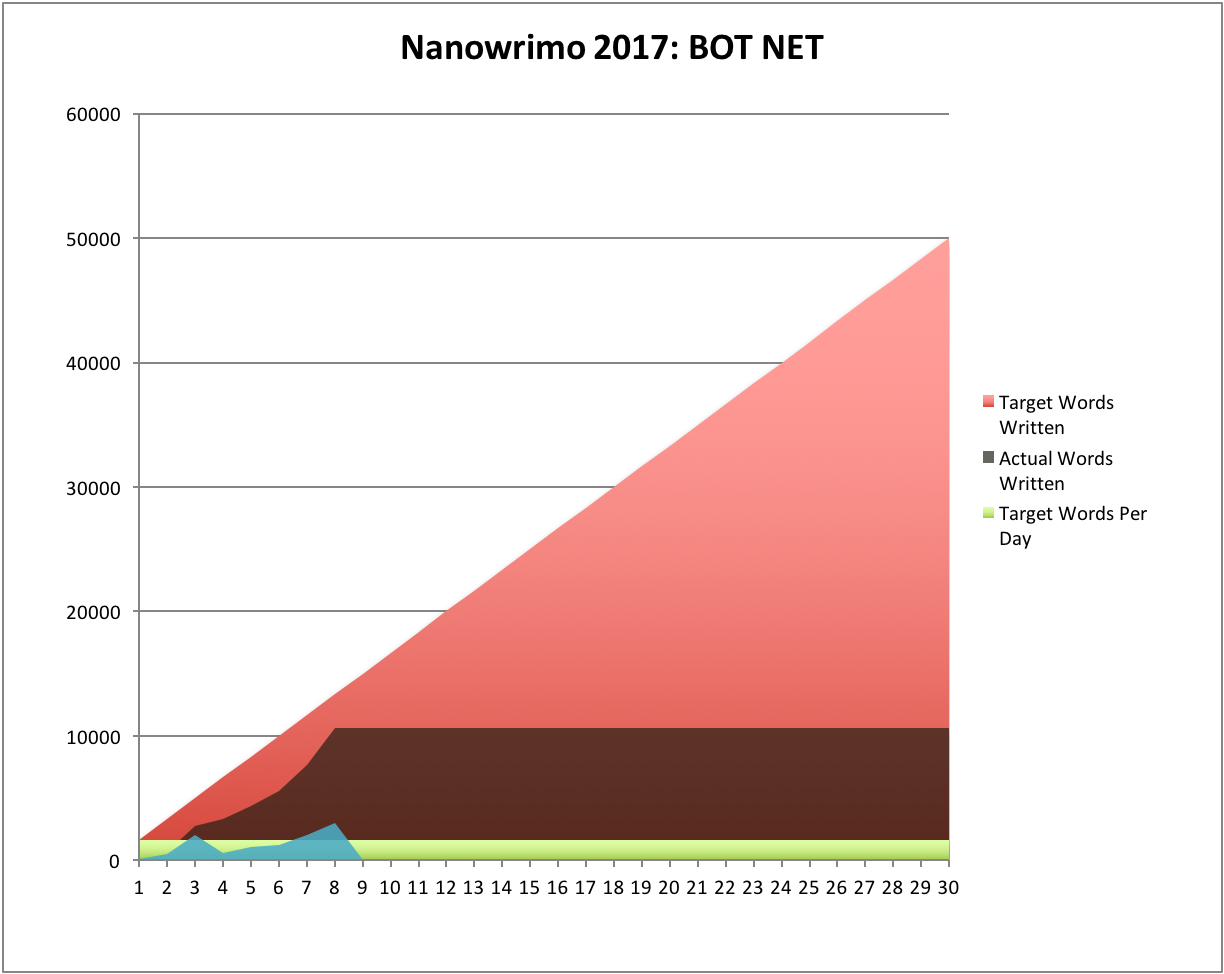 The bad news: I need to be at 13,333 words by today!
The bad news: I need to be at 13,333 words by today!
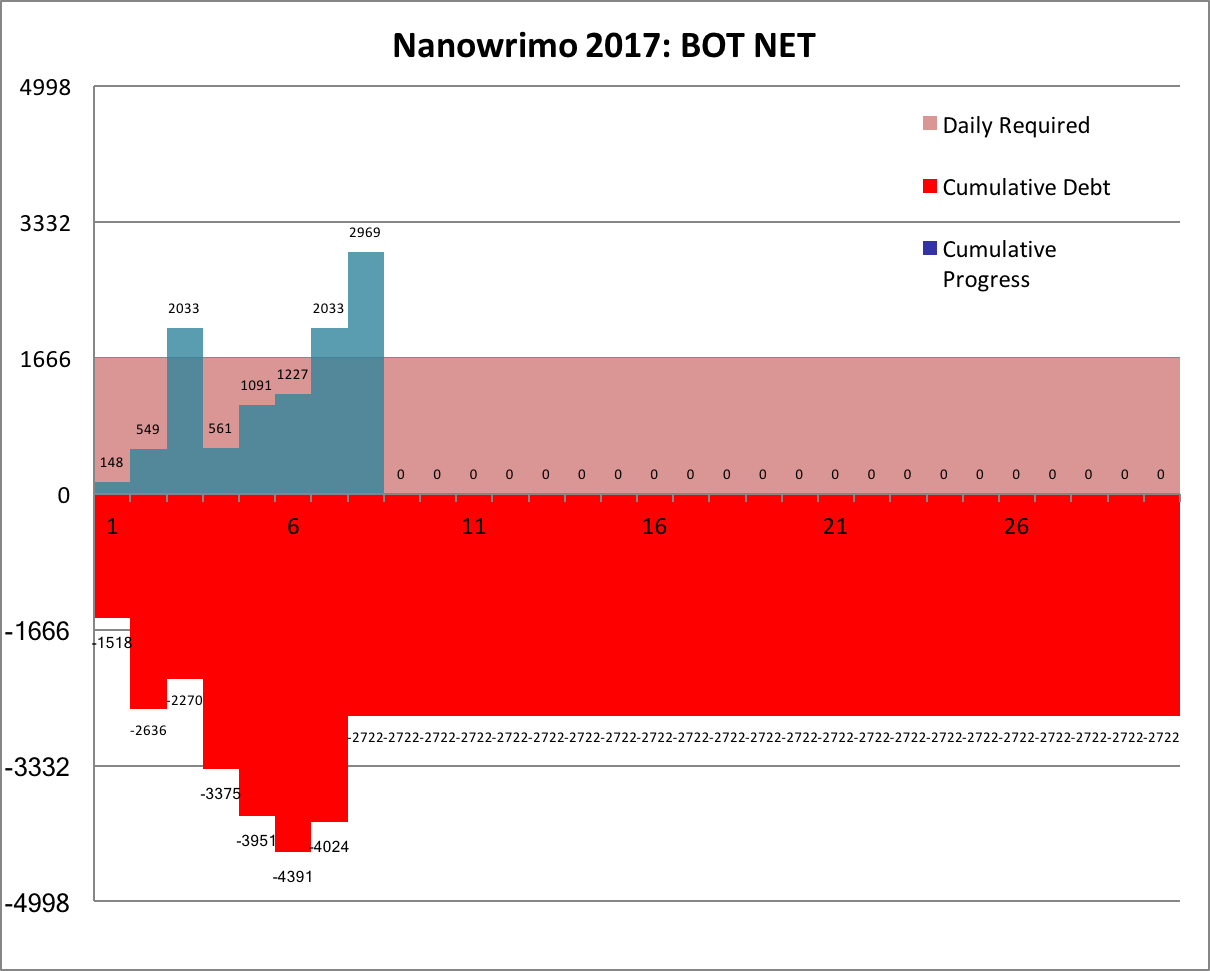 The good-bad news is, normally I'm closer to 4500 words behind at this point of Nano, so I am ahead of where I am normally behind:
The good-bad news is, normally I'm closer to 4500 words behind at this point of Nano, so I am ahead of where I am normally behind:
 What can I. say? "Don't get cocky, kid." Back to it ...
-the Centaur
What can I. say? "Don't get cocky, kid." Back to it ...
-the Centaur 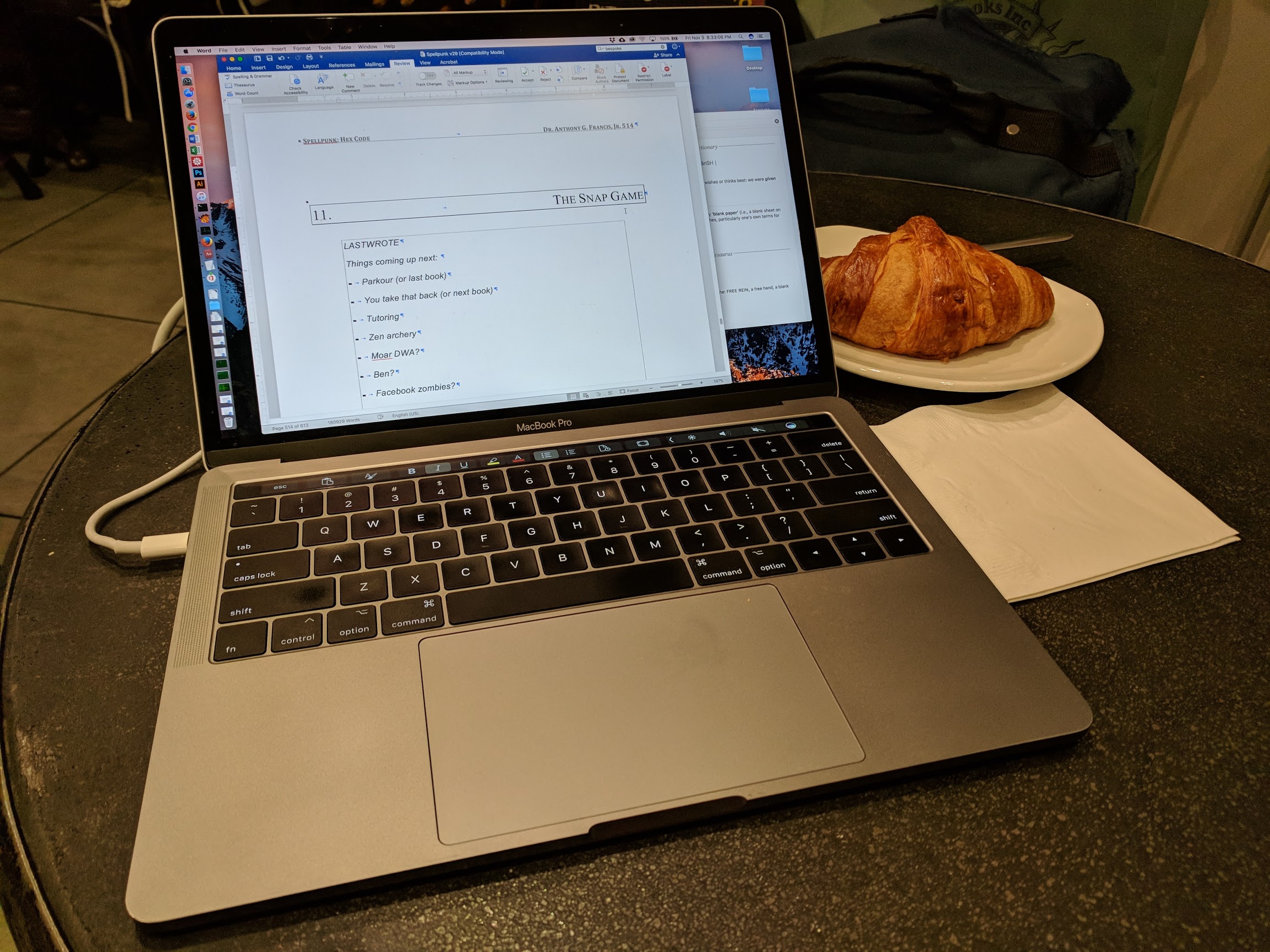 "Okay, so ... um, hi! I'm Cinnamon Frost, and I'm here to tell you that my biographer, Anthony Francis, is busy as fuck writing
"Okay, so ... um, hi! I'm Cinnamon Frost, and I'm here to tell you that my biographer, Anthony Francis, is busy as fuck writing 



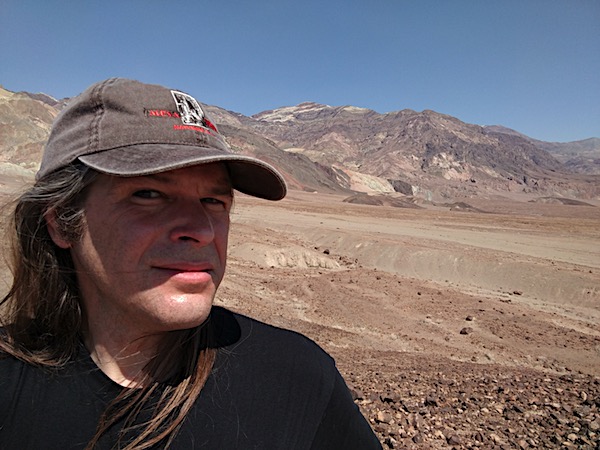






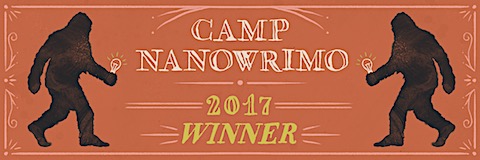
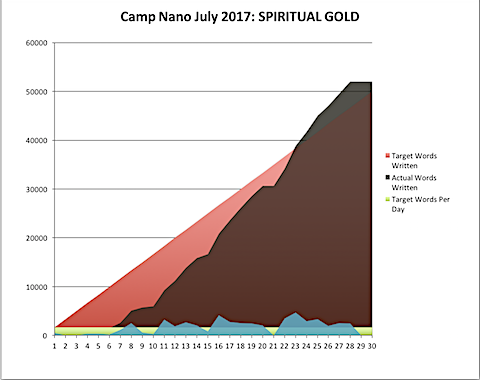
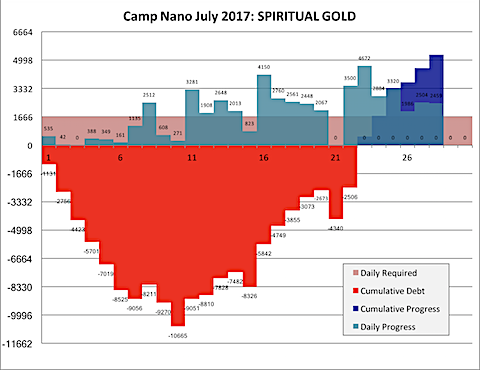
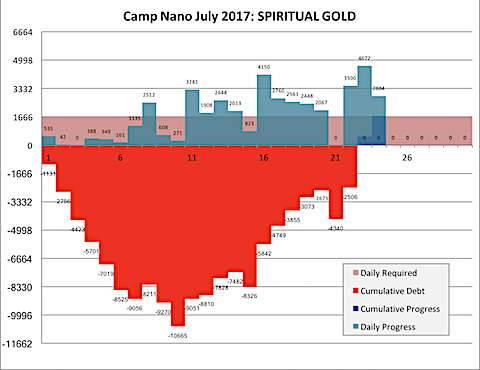
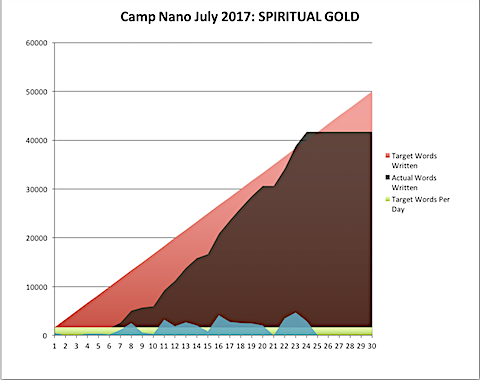
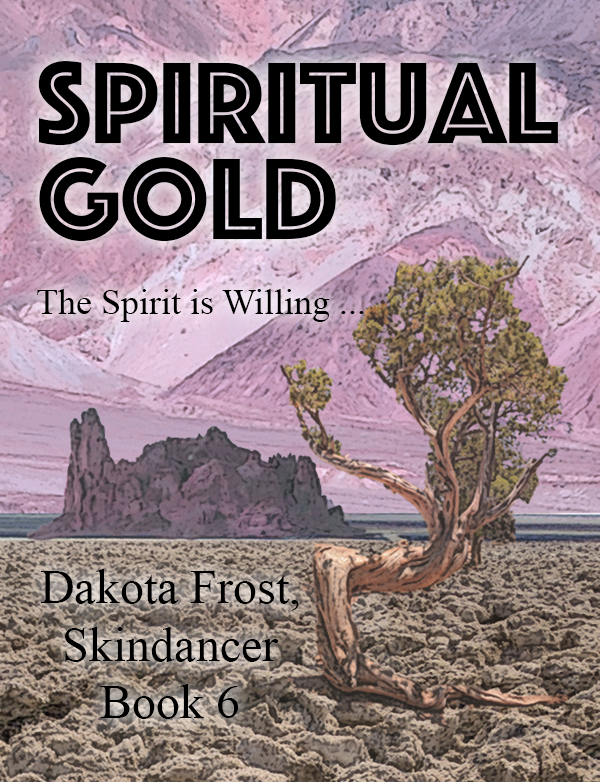
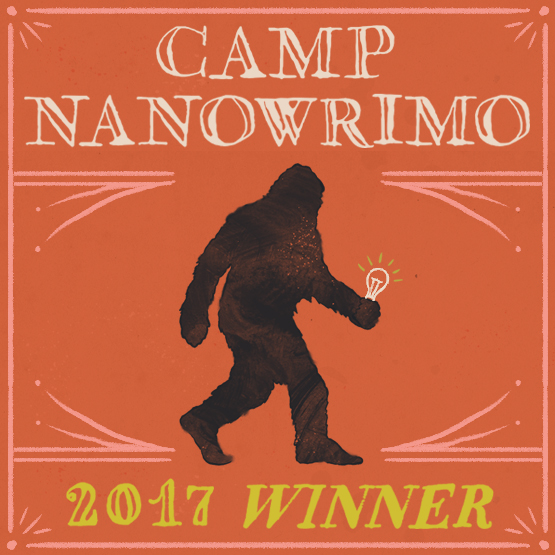 Huzzah! I have once again completed Camp Nano, the little sister to National Novel Writing Month! This marks the seventeenth time I've written 50,000 words in a month!
Huzzah! I have once again completed Camp Nano, the little sister to National Novel Writing Month! This marks the seventeenth time I've written 50,000 words in a month!
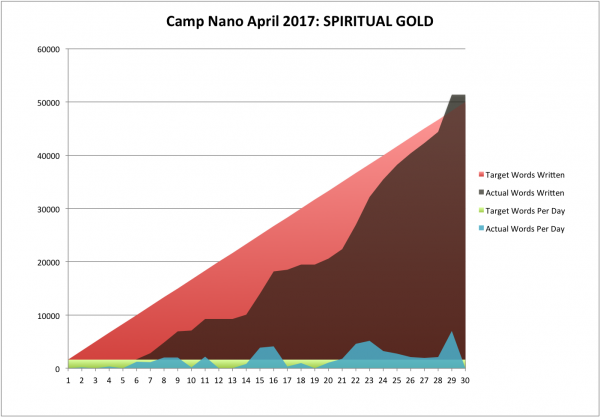 This month was pretty rough between the recent book launches of THE CLOCKWORK TIME MACHINE and the reprint of TWELVE HOURS LATER, not to mention the upcoming release of SOME TIME LATER - plus a whole bunch of work at work-work teaching robots to learn when the darn things just want to not learn.
This month was pretty rough between the recent book launches of THE CLOCKWORK TIME MACHINE and the reprint of TWELVE HOURS LATER, not to mention the upcoming release of SOME TIME LATER - plus a whole bunch of work at work-work teaching robots to learn when the darn things just want to not learn.
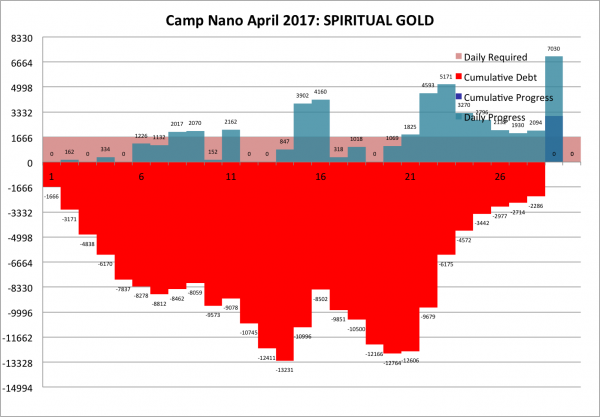 That left blood in the water for most of the month, but I really, really, really wanted to be able to take Sunday off and spend time at church, with my wife and cats, and getting caught up on stuff, so I powered through it, trying to make sure I didn't just finish the 50,000 by my count, but also finished the extra ~1500 or so words caused by the discrepancy between the Camp Nano word counter and the one on Microsoft Word, which I use every day.
That left blood in the water for most of the month, but I really, really, really wanted to be able to take Sunday off and spend time at church, with my wife and cats, and getting caught up on stuff, so I powered through it, trying to make sure I didn't just finish the 50,000 by my count, but also finished the extra ~1500 or so words caused by the discrepancy between the Camp Nano word counter and the one on Microsoft Word, which I use every day.
 I was really struggling until I remembered working on my first Nano project, FROST MOON, in which I had to take my characters to the "werehouse" ... which I had no idea how to write ... but just dove in, creating some wonderful ideas that fleshed out the story wonderfully, including Cinnamon Frost. Well, this time I had Dakota and one of her friends heading to a Hopi kiva, and I had no idea how to write that either ... so I just dove in:
I was really struggling until I remembered working on my first Nano project, FROST MOON, in which I had to take my characters to the "werehouse" ... which I had no idea how to write ... but just dove in, creating some wonderful ideas that fleshed out the story wonderfully, including Cinnamon Frost. Well, this time I had Dakota and one of her friends heading to a Hopi kiva, and I had no idea how to write that either ... so I just dove in:
 Best of luck, fellow Camp Nano campers!
-the Centaur
Best of luck, fellow Camp Nano campers!
-the Centaur 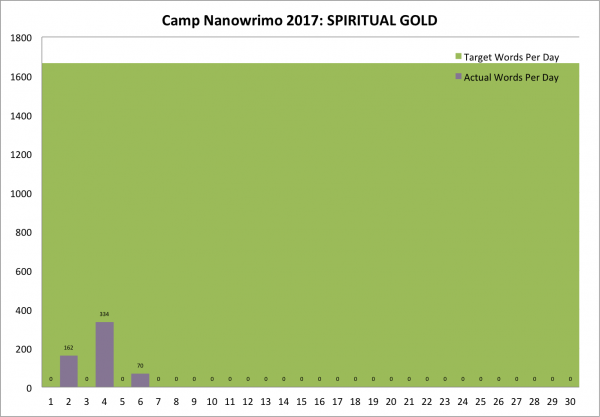 Ugh. Once again, struggling to get started on Nanowrimo. It isn't like I have one project struggling to survive at work and three others struggling to get off the ground, or two books to launch, or promotion on two books already out! Excuses, excuses, if I showed my normal graph it would just be blood in the water - I'm doing hundreds of words a day on Camp Nano when I need thousands.
But I also freely admit I'm cheating here. The events of Dakota Frost Book 6 are going to come back later - possibly much later, most likely somewhere in books 10-12 - and I got inspired to write that scene, which I write in the rough draft manuscript for SPIRITUAL GOLD until I decide into which book that scene will land. That inflates the word count of SG a bit ... but it also gives me a very clear outcome to drive towards when I work on the scenes in this book that set up the scenes for that book in the far future...
Onward!
-the Centaur
Ugh. Once again, struggling to get started on Nanowrimo. It isn't like I have one project struggling to survive at work and three others struggling to get off the ground, or two books to launch, or promotion on two books already out! Excuses, excuses, if I showed my normal graph it would just be blood in the water - I'm doing hundreds of words a day on Camp Nano when I need thousands.
But I also freely admit I'm cheating here. The events of Dakota Frost Book 6 are going to come back later - possibly much later, most likely somewhere in books 10-12 - and I got inspired to write that scene, which I write in the rough draft manuscript for SPIRITUAL GOLD until I decide into which book that scene will land. That inflates the word count of SG a bit ... but it also gives me a very clear outcome to drive towards when I work on the scenes in this book that set up the scenes for that book in the far future...
Onward!
-the Centaur  (No, that ain't the real cover, that's 10 minutes in Photoshop working over a
(No, that ain't the real cover, that's 10 minutes in Photoshop working over a 